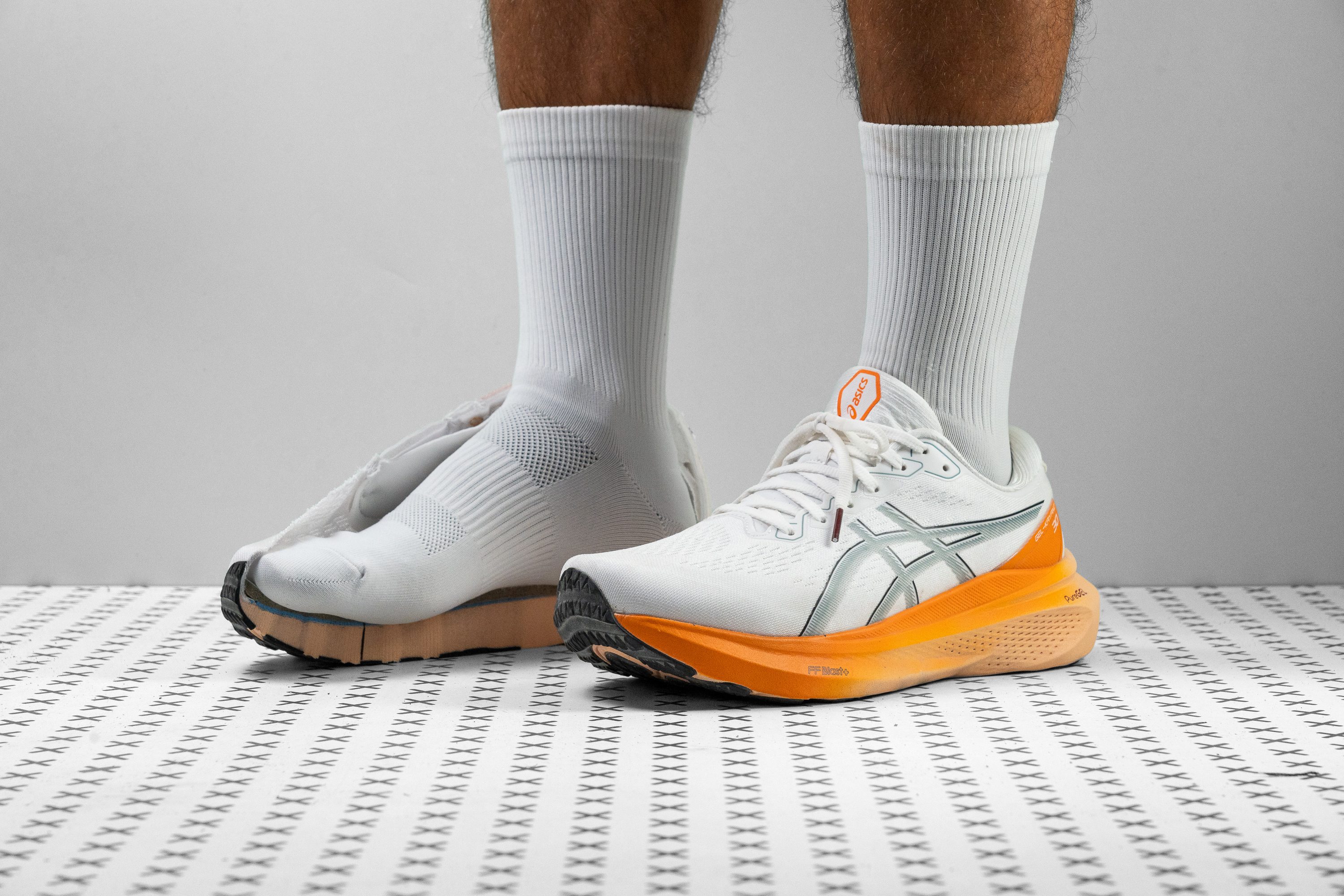Our verdict
Pros
- Exceptionally cushioned
- Impressively stable with 4D Guidance System
- Lighter than it seems
- Top-notch breathability
- Better shock absorption
- Superior durability and comfort
- Ideal for high-mileage runners
- Amazing build quality
- Solid traction
Cons
- Actual drop exceeds stated measurement
- Midsole might require a break-in period
- Low energy return
Audience verdict
- Top 14% most popular running shoes
Comparison
The most similar running shoes compared
+ + Add a shoe | |||||
|---|---|---|---|---|---|
| Audience score | 87 Great! | 88 Great! | 80 Good! | 83 Good! | |
| Price | £180 | £160 | £110 | £180 | |
| Pace | Daily running | Daily running | Daily running | Daily running | |
| Shock absorption | Moderate | - | High | High | |
| Energy return | Low | - | Moderate | Low | |
| Traction | High | - | High | High | |
| Arch support | Stability | Stability | Stability | Stability | |
| Weight lab Weight brand | 10.7 oz / 303g 10.7 oz / 303g | 11.6 oz / 329g 11.8 oz / 334g | 8.1 oz / 231g 8 oz / 228g | 10.4 oz / 295g 10.7 oz / 304g | |
| Lightweight | ✗ | ✗ | ✓ | ✗ | |
| Drop lab Drop brand | 12.0 mm 10.0 mm | 7.2 mm 8.0 mm | 9.4 mm 5.0 mm | 9.3 mm 8.0 mm | |
| Strike pattern | Heel | HeelMid/forefoot | HeelMid/forefoot | HeelMid/forefoot | |
| Size | Slightly small | Slightly small | Slightly small | True to size | |
| Midsole softness | Soft | Balanced | Soft | Balanced | |
| Difference in midsole softness in cold | Big | Normal | Big | Small | |
| Toebox durability | Good | Decent | Bad | Good | |
| Heel padding durability | Bad | Bad | Decent | Good | |
| Outsole durability | Good | Good | Bad | Good | |
| Breathability | Breathable | Moderate | Breathable | Moderate | |
| Width / fit | Medium | Medium | Narrow | Medium | |
| Toebox width | Medium | Wide | Narrow | Medium | |
| Stiffness | Moderate | Stiff | Moderate | Moderate | |
| Torsional rigidity | Stiff | Stiff | Stiff | Stiff | |
| Heel counter stiffness | Stiff | Stiff | Stiff | Stiff | |
| Rocker | ✓ | ✗ | ✓ | ✗ | |
| Heel lab Heel brand | 39.7 mm 40.0 mm | 39.1 mm 41.0 mm | 36.0 mm 33.0 mm | 39.9 mm 40.0 mm | |
| Forefoot lab Forefoot brand | 27.7 mm 30.0 mm | 31.9 mm 33.0 mm | 26.6 mm 28.0 mm | 30.6 mm 32.0 mm | |
| Widths available | NormalWide | NormalWide | NormalWide | NormalWideX-Wide | |
| Orthotic friendly | ✓ | ✓ | ✓ | ✓ | |
| Season | SummerAll seasons | All seasons | SummerAll seasons | All seasons | |
| Removable insole | ✓ | ✓ | ✓ | ✓ | |
| Ranking | #312 Top 47% | #140 Top 37% | #318 Bottom 16% | #277 Bottom 27% | |
| Popularity | #90 Top 14% | #298 Bottom 21% | #56 Top 15% | #21 Top 6% |
Who should buy
In our opinion, the ASICS Gel Kayano 30 is the ideal choice for runners who:
- are looking for a stability shoe with an incredible amount of foam.
- desire a daily trainer that provides a smooth ride without the instability often found in some maximalist shoes.
- are high-mileage enthusiasts in search of a stable, well-built, breathable shoe.
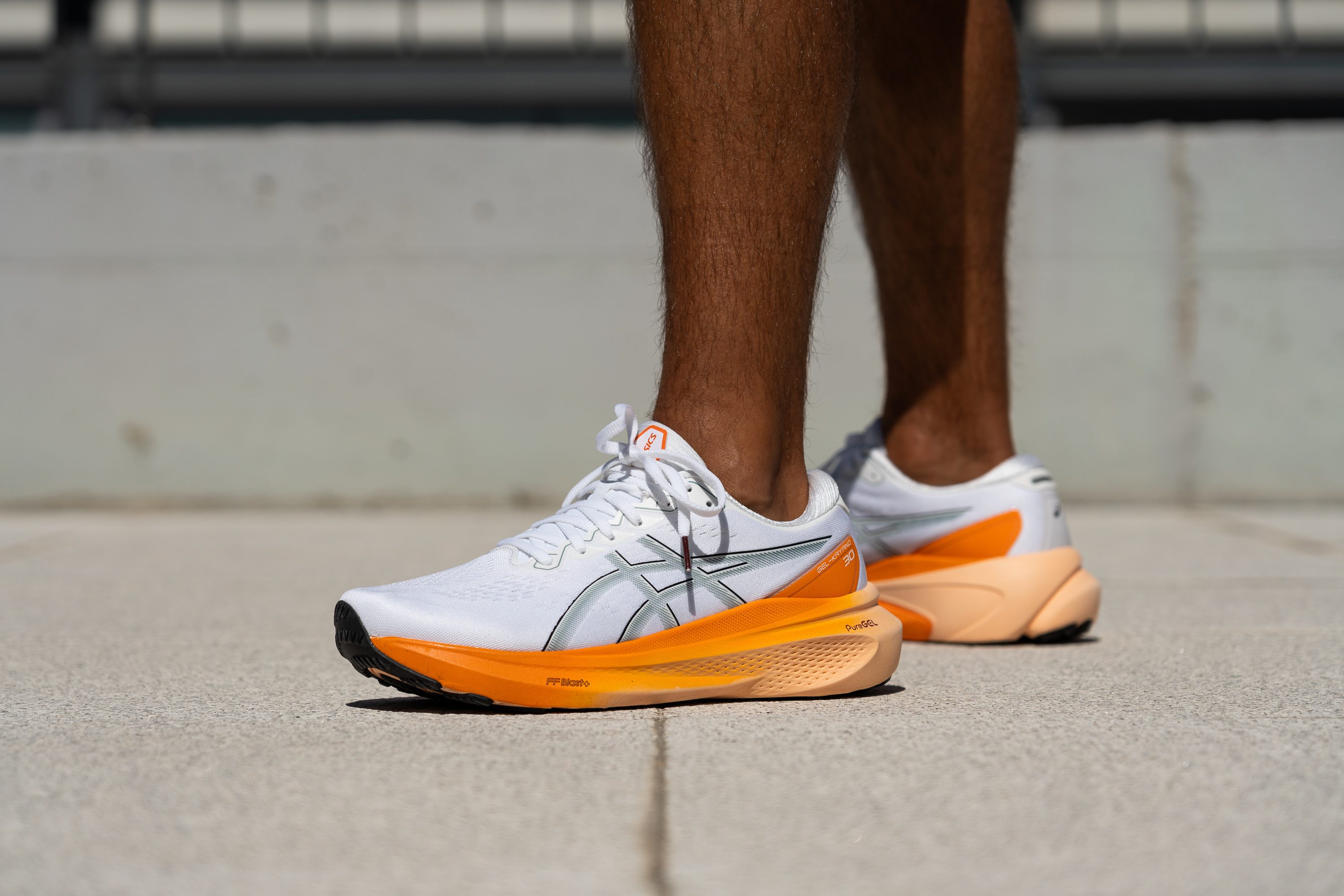
Who should NOT buy
The ASICS Gel Kayano 30 is the ideal choice for runners who prioritise stability and a plush ride. However, for runners who prioritise ground feel and a natural running sensation, we believe the Kayano 30 might not meet the expectations. Its substantial stack height combined with soft foam creates a muted ride. In those cases, we recommend the Brooks Adrenaline GTS 23 or the Saucony Tempus for a firmer, classic running feel.
Additionally, it's not our top pick for those seeking a lightweight stability shoe. While the Kayano 30 isn't heavy at all for its design, many runners don't require such monster cushioning and lean toward a lighter option. For those in this category, we think the agile Hoka Arahi 6 could be a better fit.
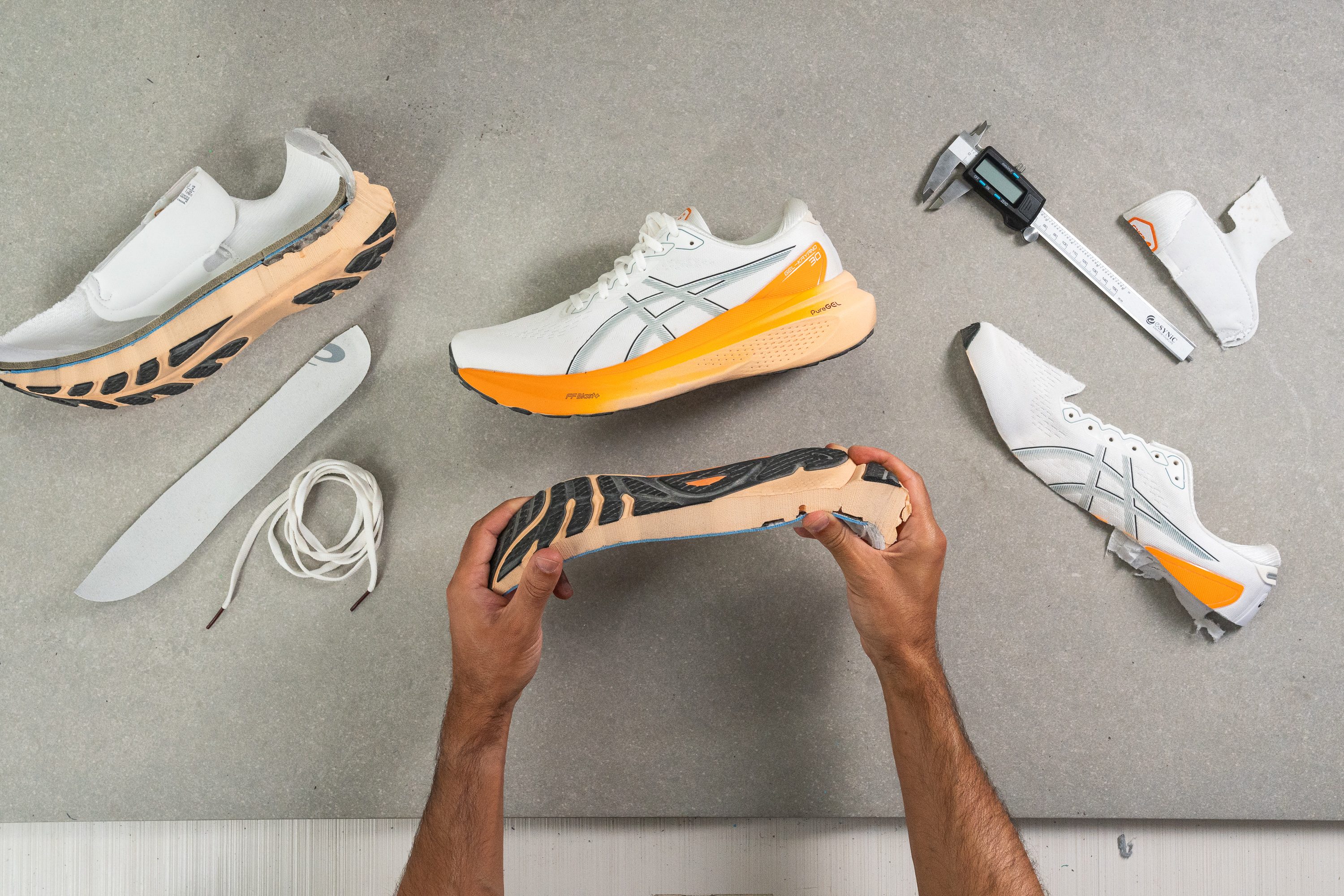
Cushioning
Shock absorption
One of the biggest flaws of the previous Kayano was its lack of shock absorption, and ASICS fixed that with the 30th edition. Now it features 126 SA in the heel and 113 SA in the forefoot, much more in line with today’s daily trainers and no longer falling short.
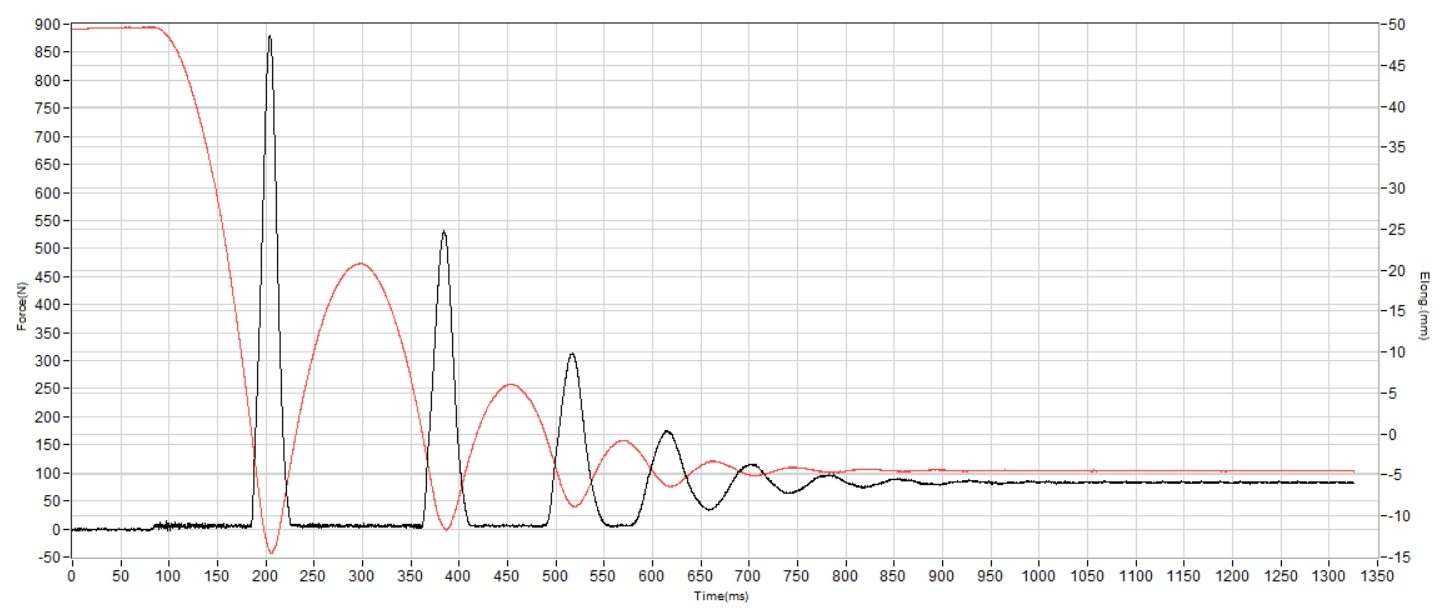
| Gel Kayano 30 | 126 SA |
| Average | 130 SA |
Energy return
However, energy return remains quite underwhelming, especially considering the high price tag of the Kayano 30. We expected a modest result after doing some runs, but 49.1% was lower than anticipated. The updated design and premium feel probably created a bit of a placebo effect on us...
| Gel Kayano 30 | 49.1% |
| Average | 58.6% |
Heel stack
Turning our attention to the midsole, the Kayano 30 boasts an impressive 39.7 mm of FF Blast+ in the heel. We're 100% sure that this stack height provides enough cushioning even in the longest runs.
FF Blast+ is ASICS' softest training foam. The Japanese brand also incorporates it into other top models like the Novablast 3 and the Cumulus 25.
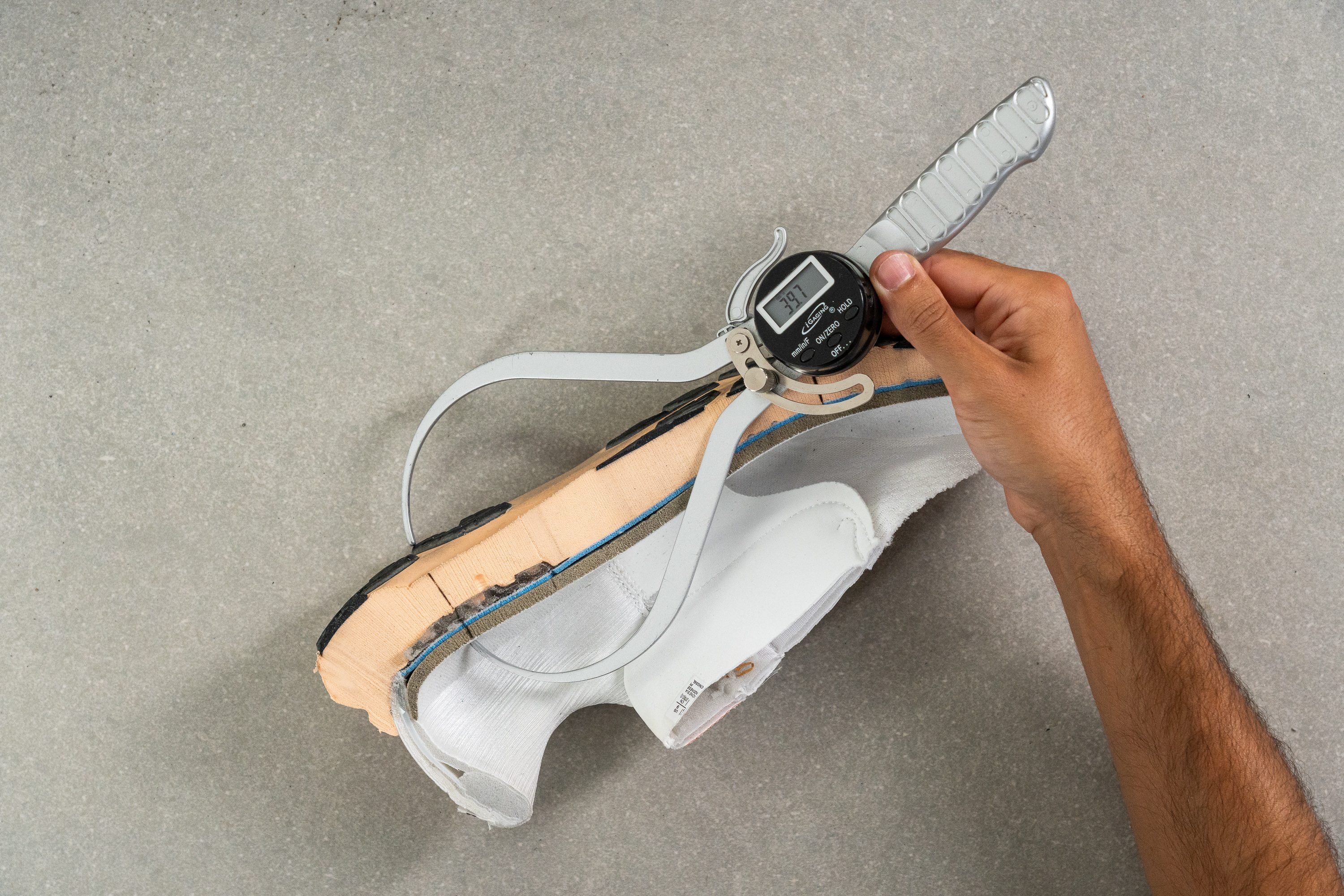
| Gel Kayano 30 | 39.7 mm |
| Average | 34.8 mm |
Forefoot stack
The forefoot is generously padded, boasting a thickness of 27.7 mm, which is more than what most shoes offer.
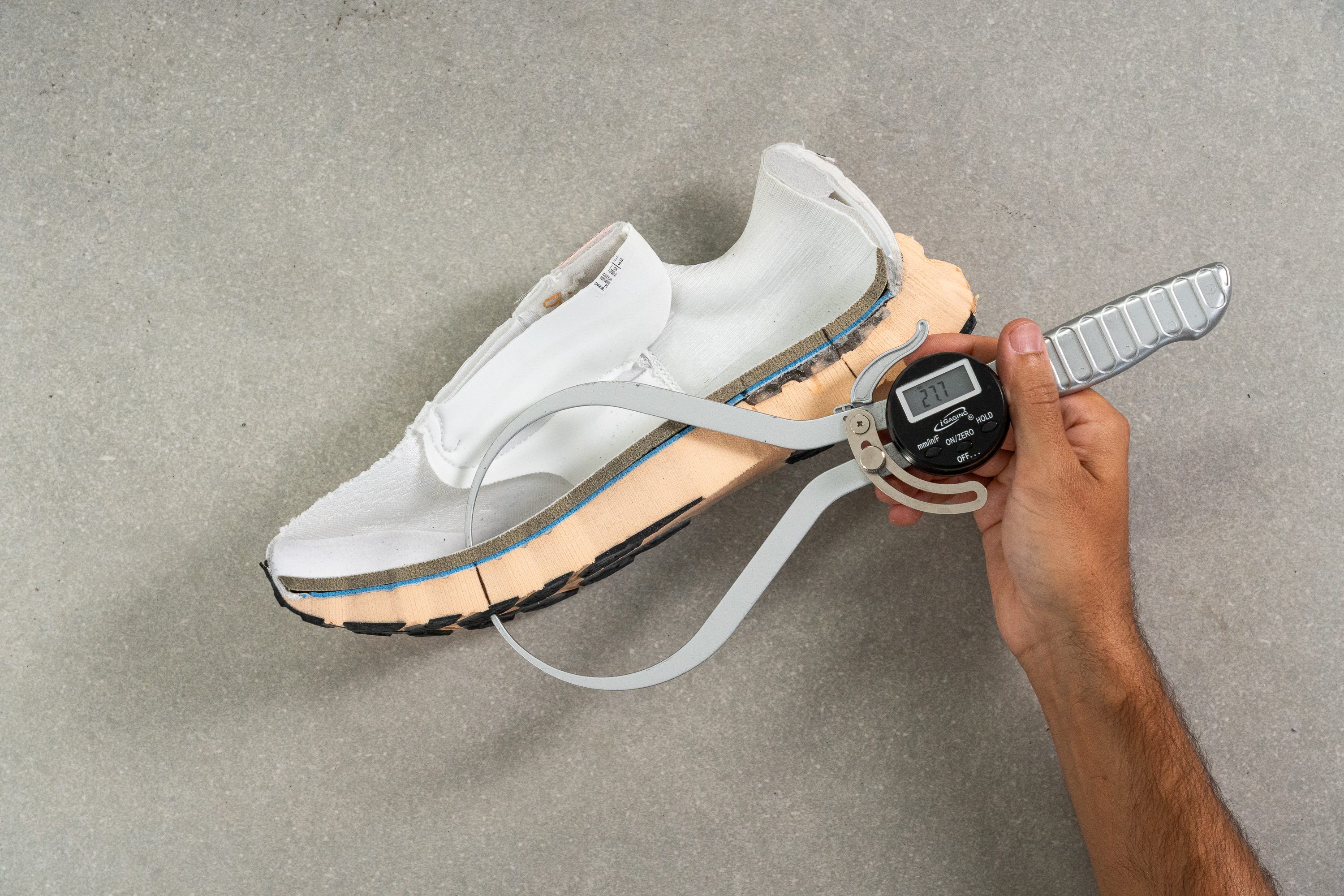
| Gel Kayano 30 | 27.7 mm |
| Average | 26.2 mm |
Drop
Designed primarily as a stability shoe for heel-strikers, we found that the Kayano 30 features a 12-mm heel-to-toe drop—2 mm more than the brand indicates.
This doesn't pose any issues. In fact, it further suits heel-strikers and provides an option for midfoot and forefoot strikers looking to ease pressure on their Achilles and calves.
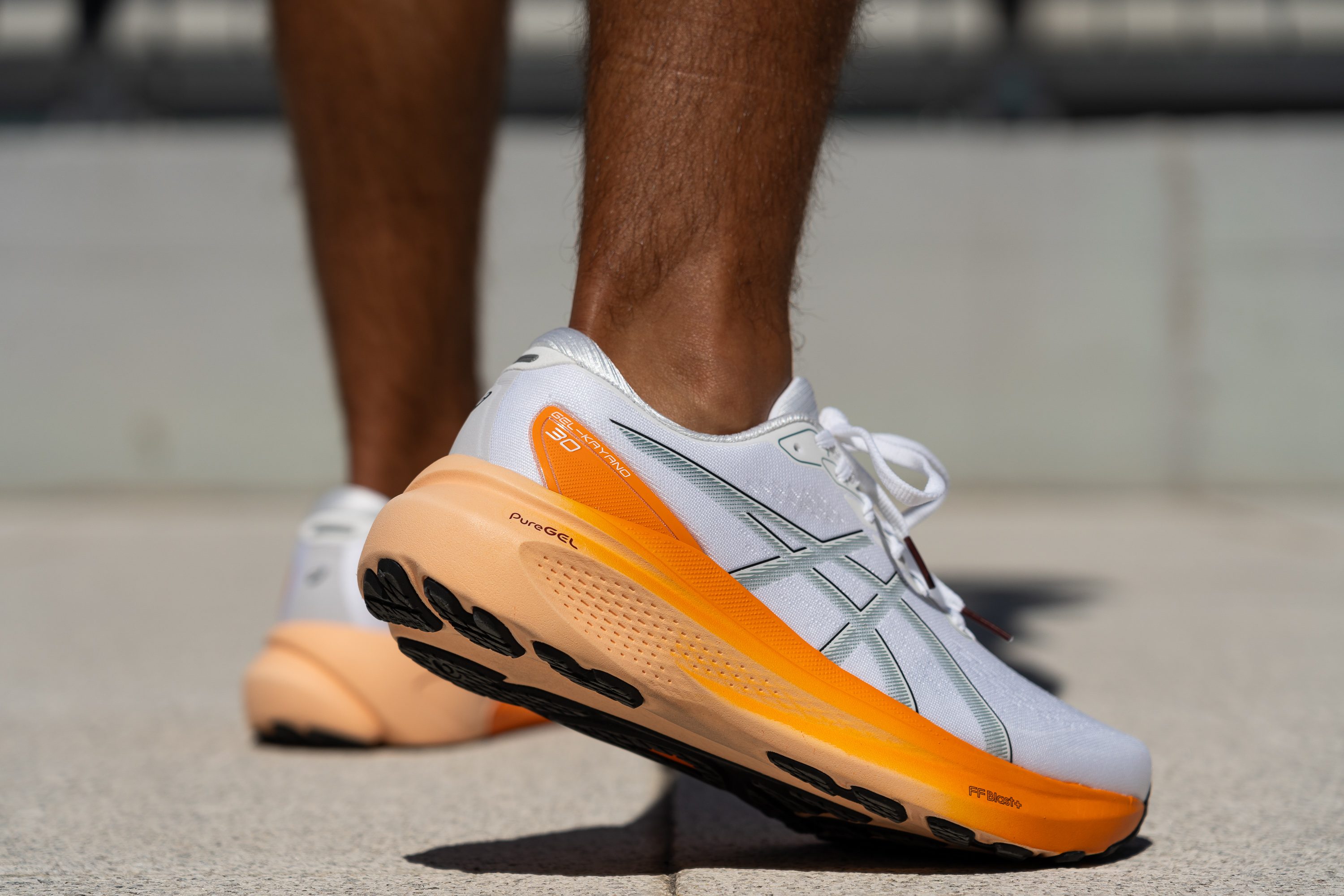
| Gel Kayano 30 | 12.0 mm |
| Average | 8.6 mm |
Midsole softness
FF Blast+ is renowned for its cloud-like feeling. With a measurement of 16.4 HA, we've confirmed it. Right from the initial run straight out of the box, the shoe was impressively soft.
ASICS also added a layer of PureGEL in the heel, which is their current implementation of the famous GEL.
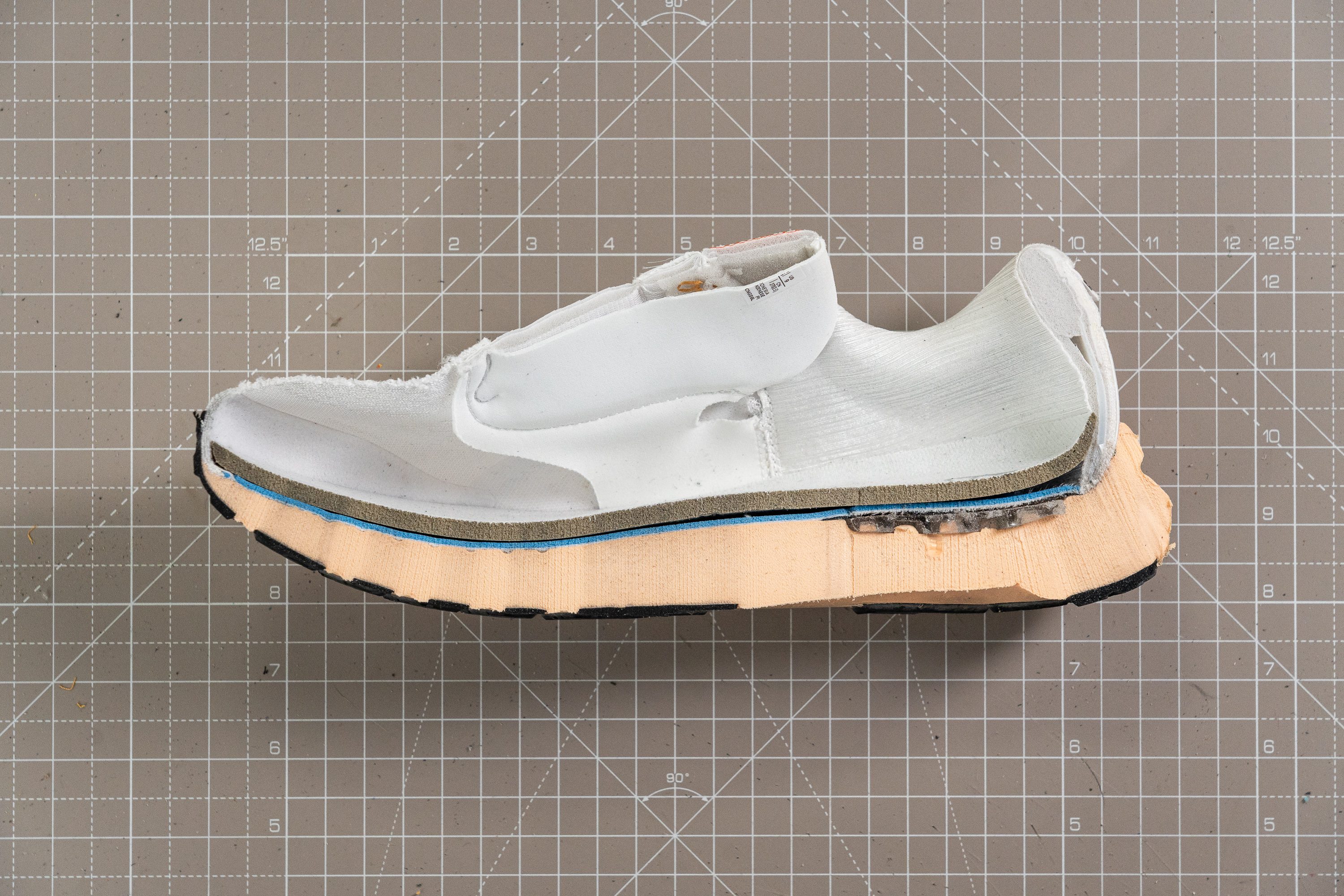
By adding this, the landing phase becomes even softer. However, considering its reduced importance in the Kayano 30 and other recent models, we believe ASICS may opt to exclude this technology in the near future.
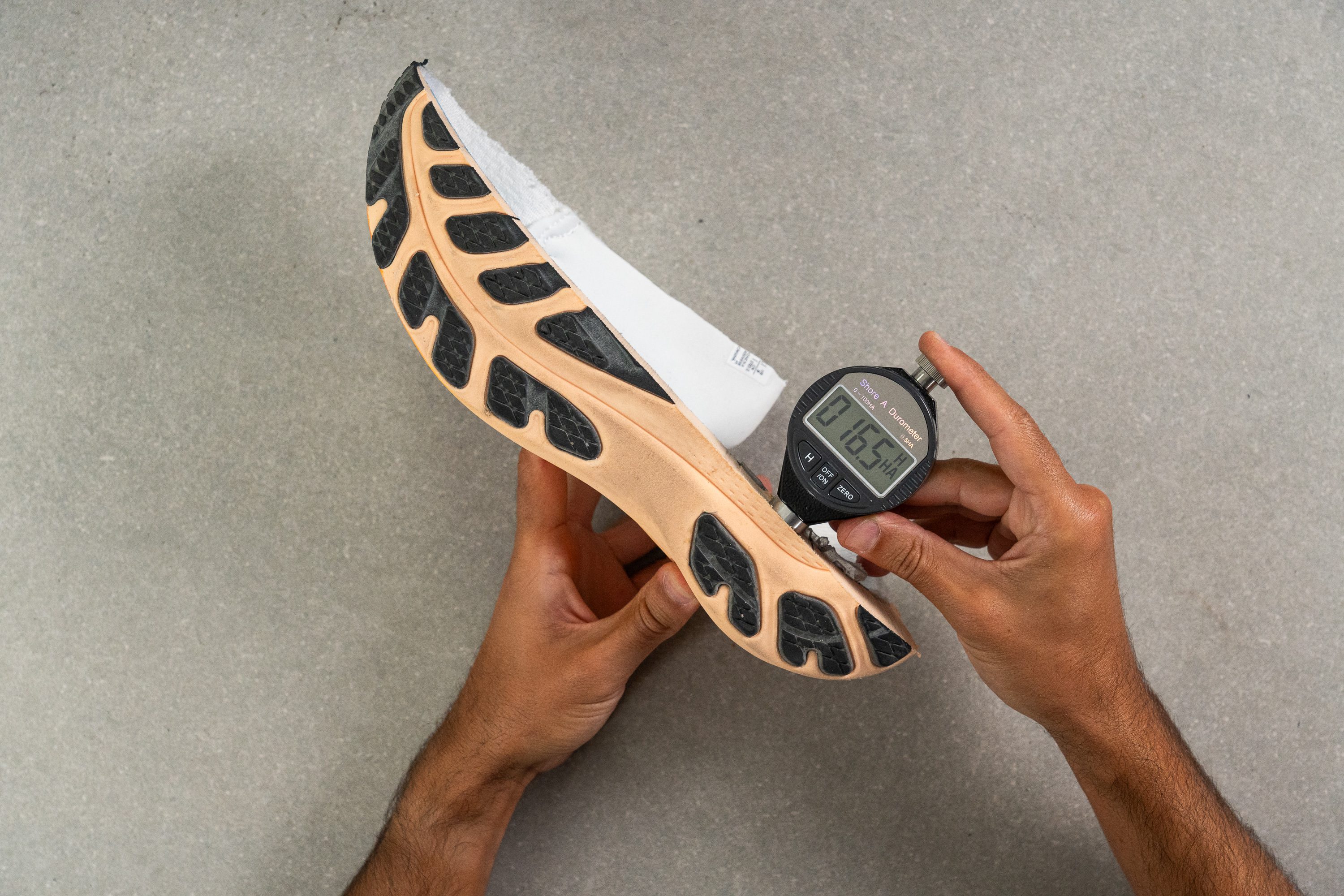
| Gel Kayano 30 | 16.4 HA |
| Average | 20.4 HA |
Size and fit
Size
ASICS Gel Kayano 30 fits slightly small (194 votes).
Internal length
ASICS stands out as one of the most consistent and reliable brands when it comes to quality control in shoe production.
Here's an example: we measured the internal length of the Kayano 30 to an impressively precise 270.4 mm. According to Asics' sizing charts, the expectation is 270 mm. Deviations from other brands are typically much larger!
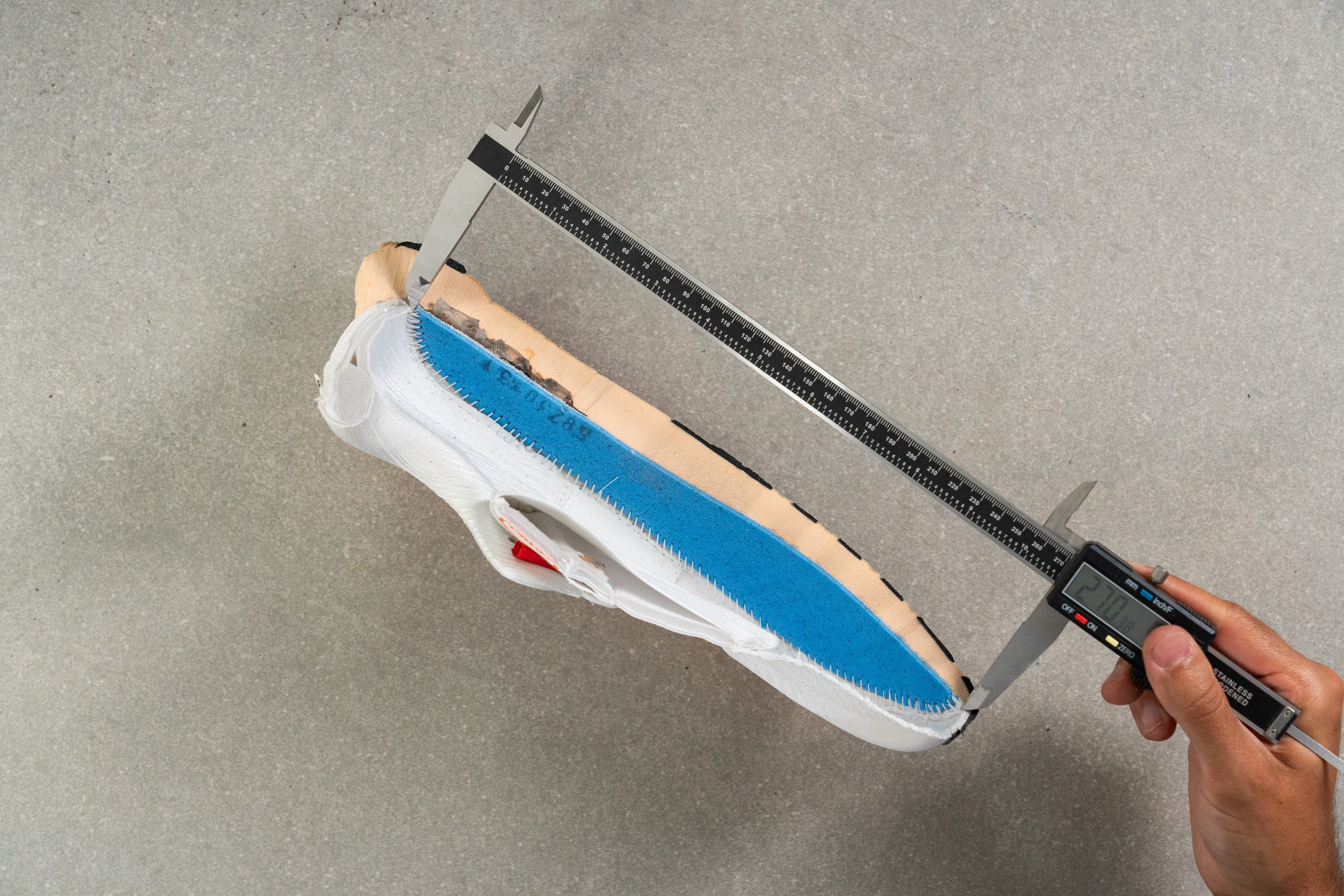
| Gel Kayano 30 | 270.4 mm |
| Average | 269.4 mm |
Toebox width - widest part
We thought that with such a wide design, the shoe's upper would feel like a spacious mansion.
Well, we found it's pretty average at 99.8 mm. This clever design choice by Kayano-san enhances stability by ensuring the foot remains centered in the shoe's gigantic landing platform.
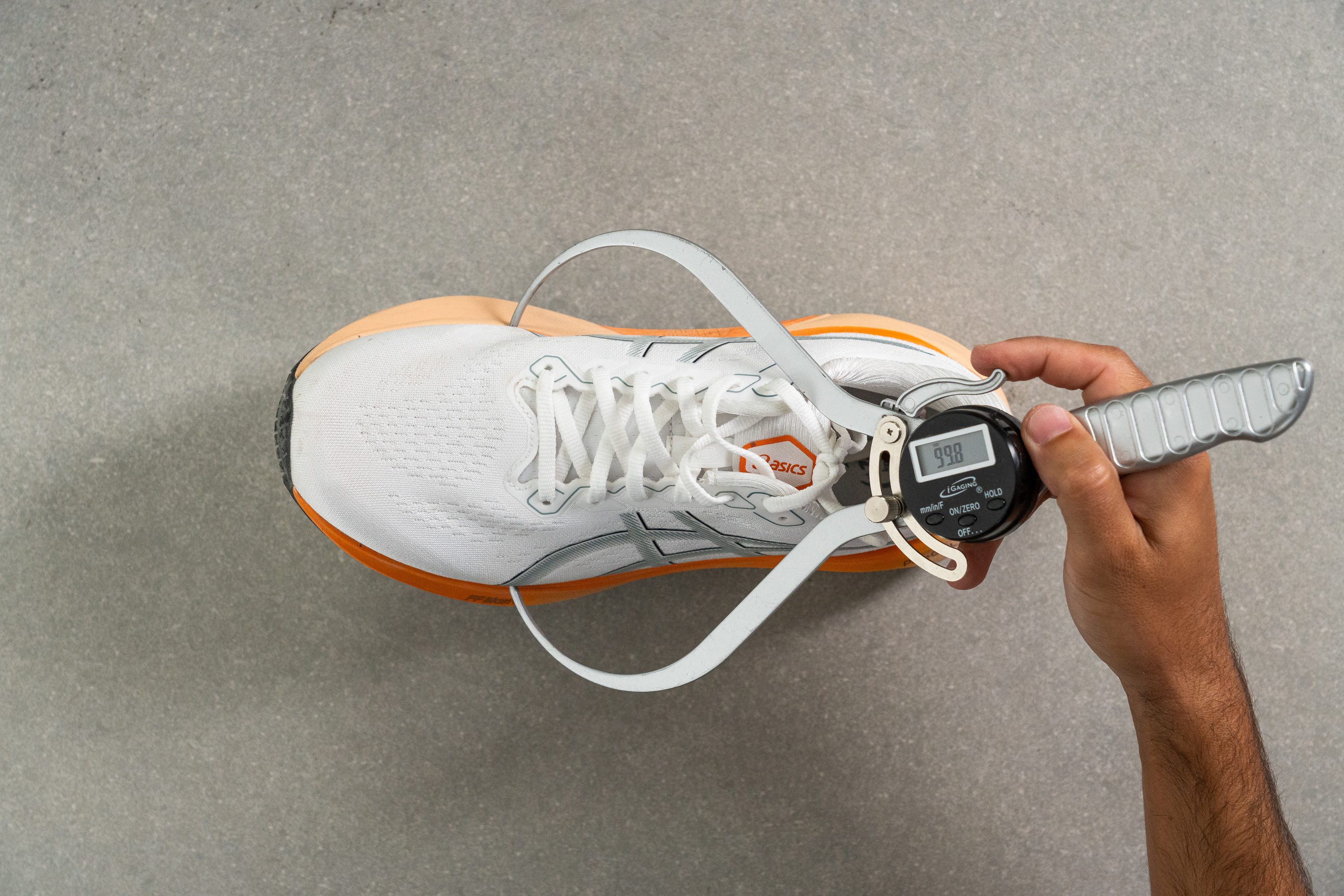
This test follows an older methodology, which is why you don't see recently tested shoes in the chart. Results from different methodologies can not be compared.
| Gel Kayano 30 | 99.8 mm |
| Average | 98.5 mm |
Toebox width - big toe
We also measure the big toe area to get a feel for the toe cap's space. With a measurement of 78.6 mm, it remains consistent with the previous number.
It's slightly larger than many other shoes, but it doesn't qualify as a wide shoe. Nonetheless, good news is that ASICS does offer this shoe in a wide size option in most countries.
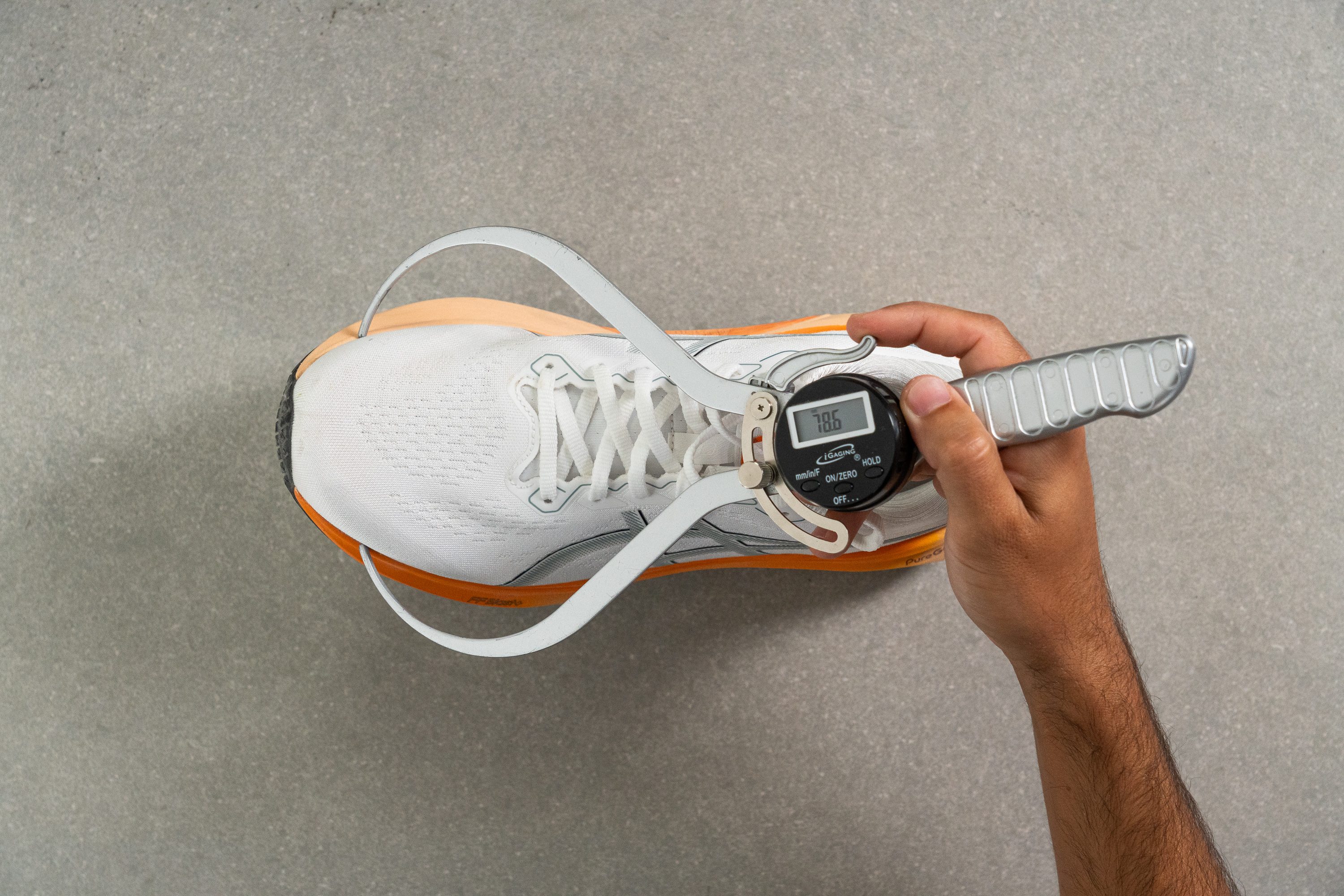
This test follows an older methodology, which is why you don't see recently tested shoes in the chart. Results from different methodologies can not be compared.
| Gel Kayano 30 | 78.6 mm |
| Average | 78.4 mm |
Traction / Grip
Traction test
We tested the Kayano’s outsole using the SATRA TM144 method under wet conditions—applying 500N of force on a 7-degree wedge and measuring dynamic friction.
After removing outliers and averaging stable readings, the Kayano scored 0.53. That’s strong performance, offering confidence-ready grip on both soaked pavement and dry surfaces. For runners needing year-round reliability from a single pair, the Kayano remains one of the most interesting options in the stability category.
| Gel Kayano 30 | 0.53 |
| Average | 0.49 |
Outsole design
The outsole isn’t fully coated in rubber, but ASICS placed thick, durable pods in all the right spots to keep weight low without sacrificing protection. We were glad to see the medial side heavily reinforced, as that's perfect for pronators.
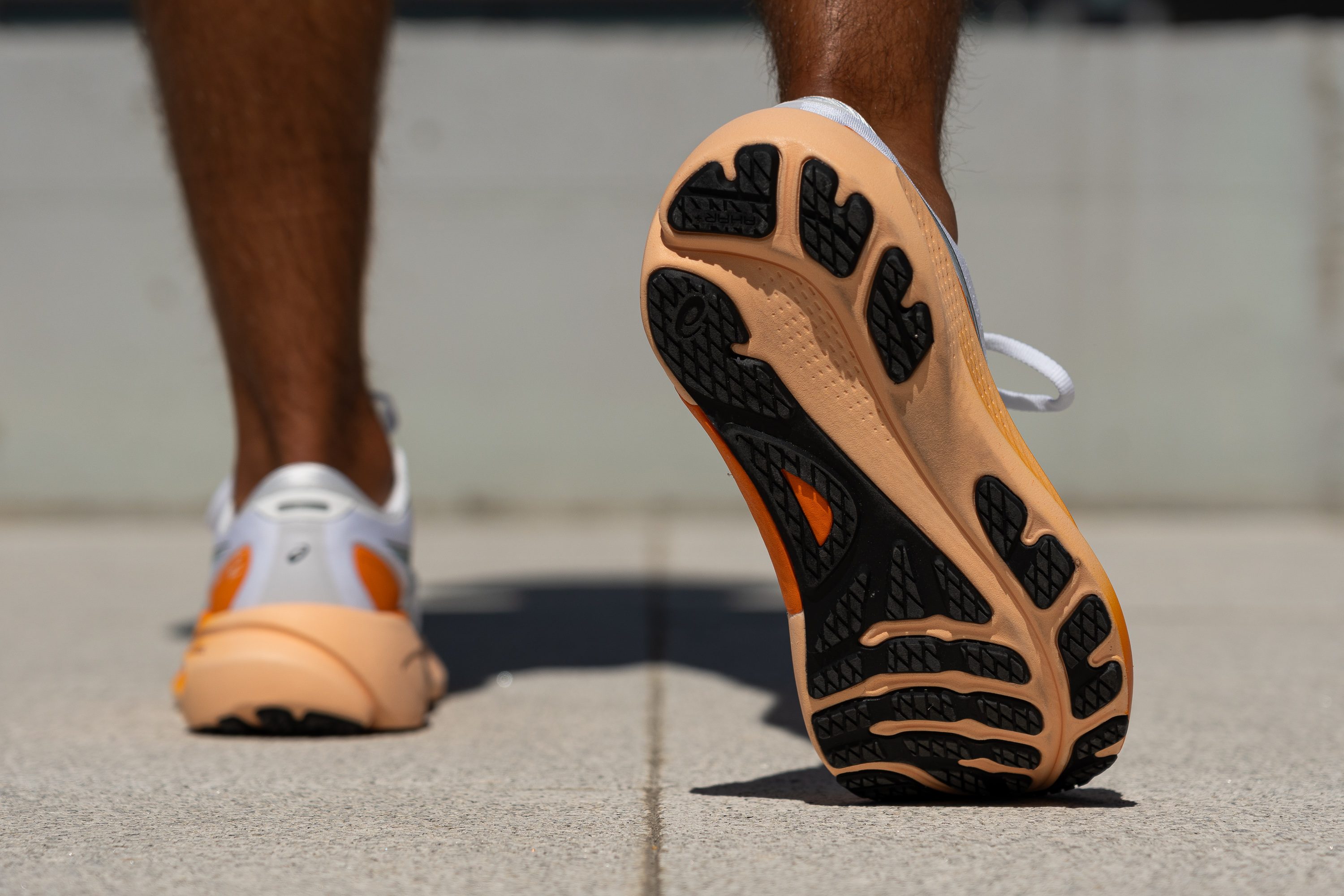
Flexibility / Stiffness
In our 90-degree test, our machine only needed 16.1N of force to bend the shoe to 30 degrees, showing its good flexibility for its huge stack height. This makes it super comfortable for long runs.
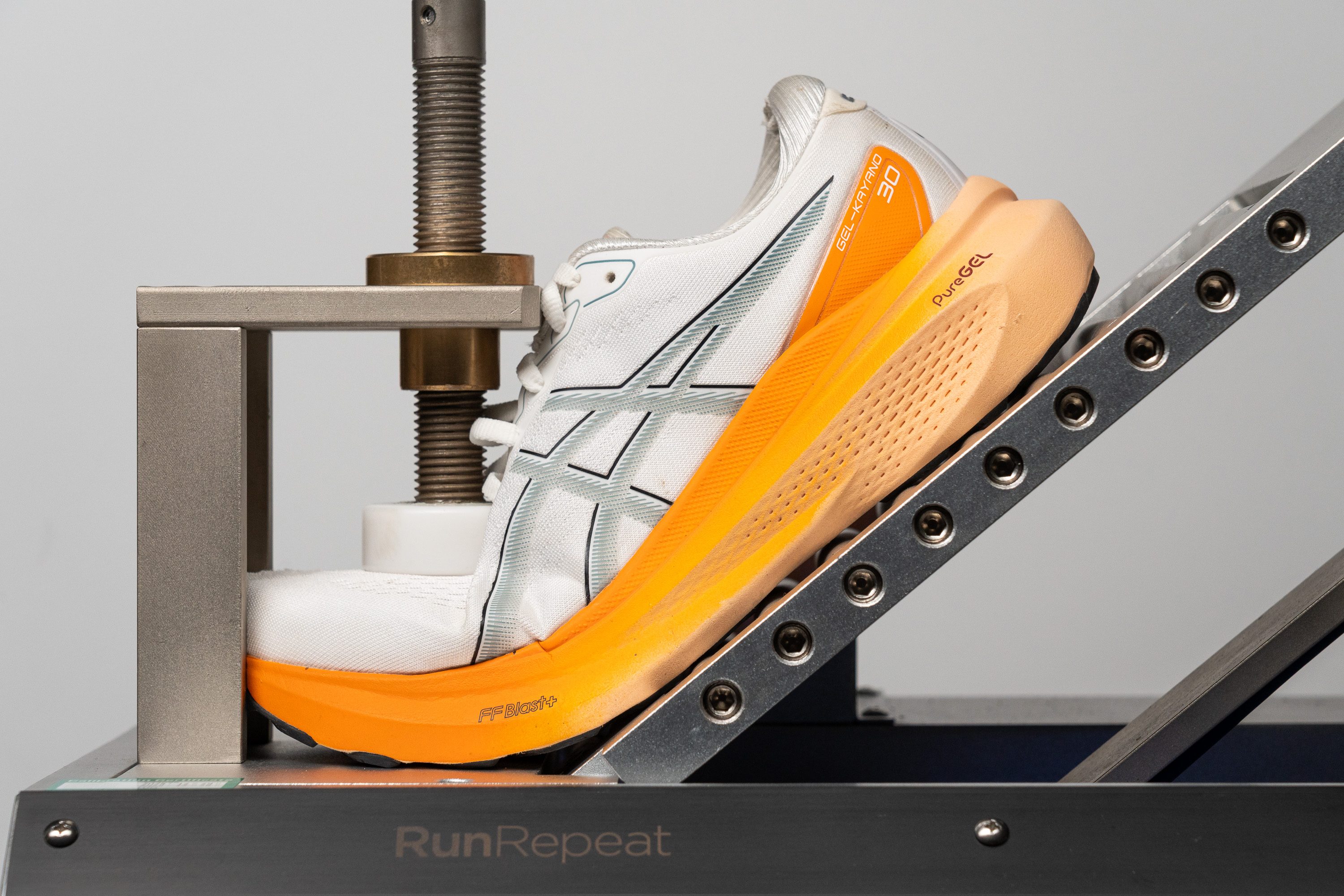
| Gel Kayano 30 | 16.1N |
| Average | 15.3N |
Stiffness in cold (%)
After placing the shoe in the freezer for 20 minutes, we tested it again. We recorded a measurement of 30.1N—indicating an excellent result for us.
Indeed, with just a 20.4% uptick, we're assured of minimal stiffness variations across season-driven temperature fluctuations.
| Gel Kayano 30 | 20% |
| Average | 33% |
Weight
Weighing in at 10.7 oz (303g), we initially thought in the lab that this shoe was on the heavier side, especially after holding it in our hands. Yet, considering its expansive width and generous foam cushioning, it's genuinely remarkable that it comes in under 11 oz for a US size 9.
Compared to the Kayano 29, the Kayano 30 impressively offers richer padding inside and more cushioned FF Blast+ in the midsole—all while maintaining the same weight!
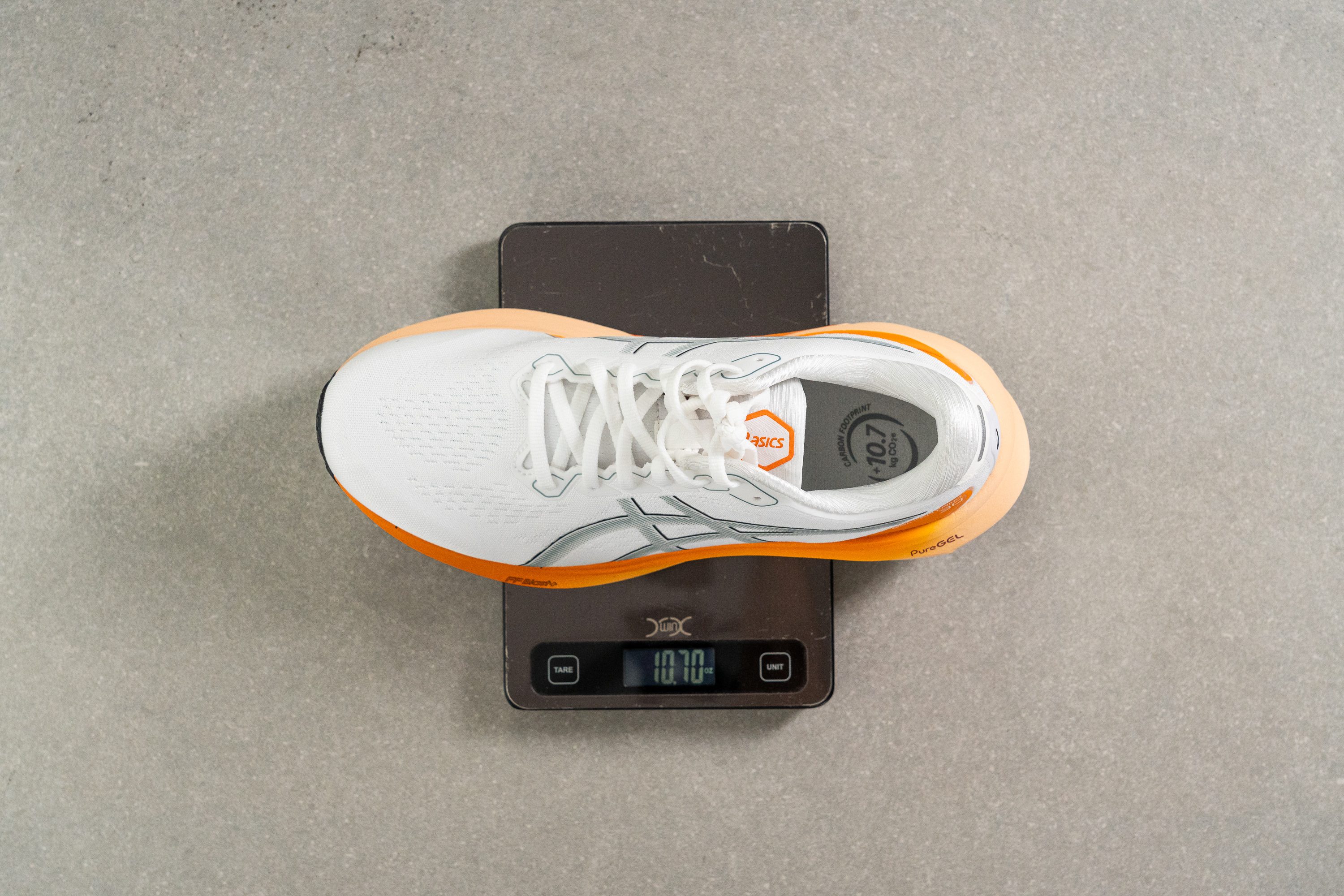
| Gel Kayano 30 | 10.7 oz (303g) |
| Average | 9.3 oz (264g) |
Breathability
Expectations for the Kayano 30's performance were sky-high, especially given ASICS's track record of crafting top-notch uppers in terms of breathability and comfort—even in race-ready shoes like the Metaspeed Sky+.
We put the 30th iteration of the series designed by Toshikazu Kayano to the test and came away impressed. When subjected to our smoke test, the shoe demonstrated superb breathability, earning a well-deserved 5/5.
This impressive airflow can be attributed to the shoe's thin engineered mesh upper. However, a closer—almost microscope-level—look reveals an interesting design choice.
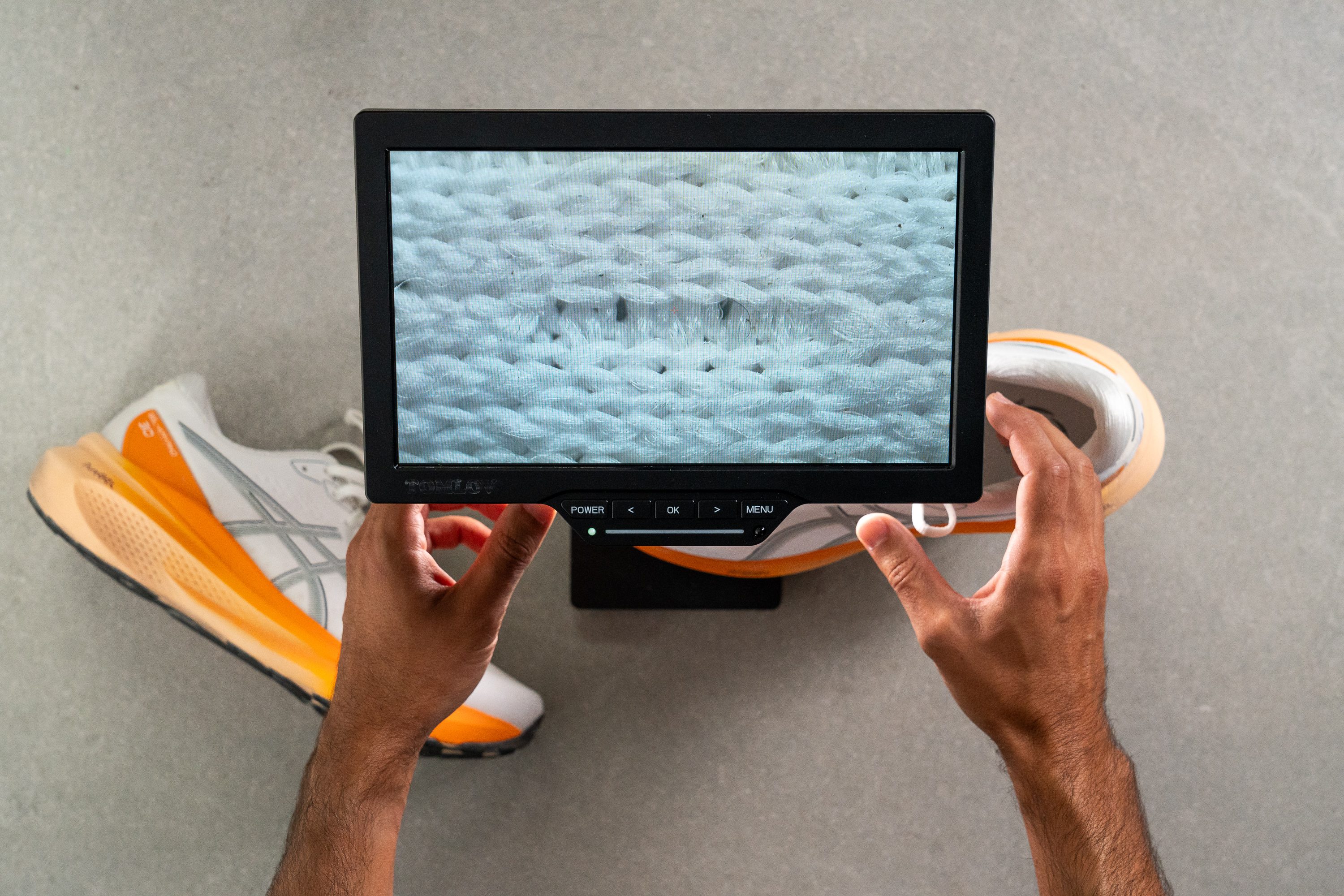
ASICS didn't opt for full ventilation holes, which can compromise structure and durability. Instead, they just removed the thickest part of the upper in those spots.
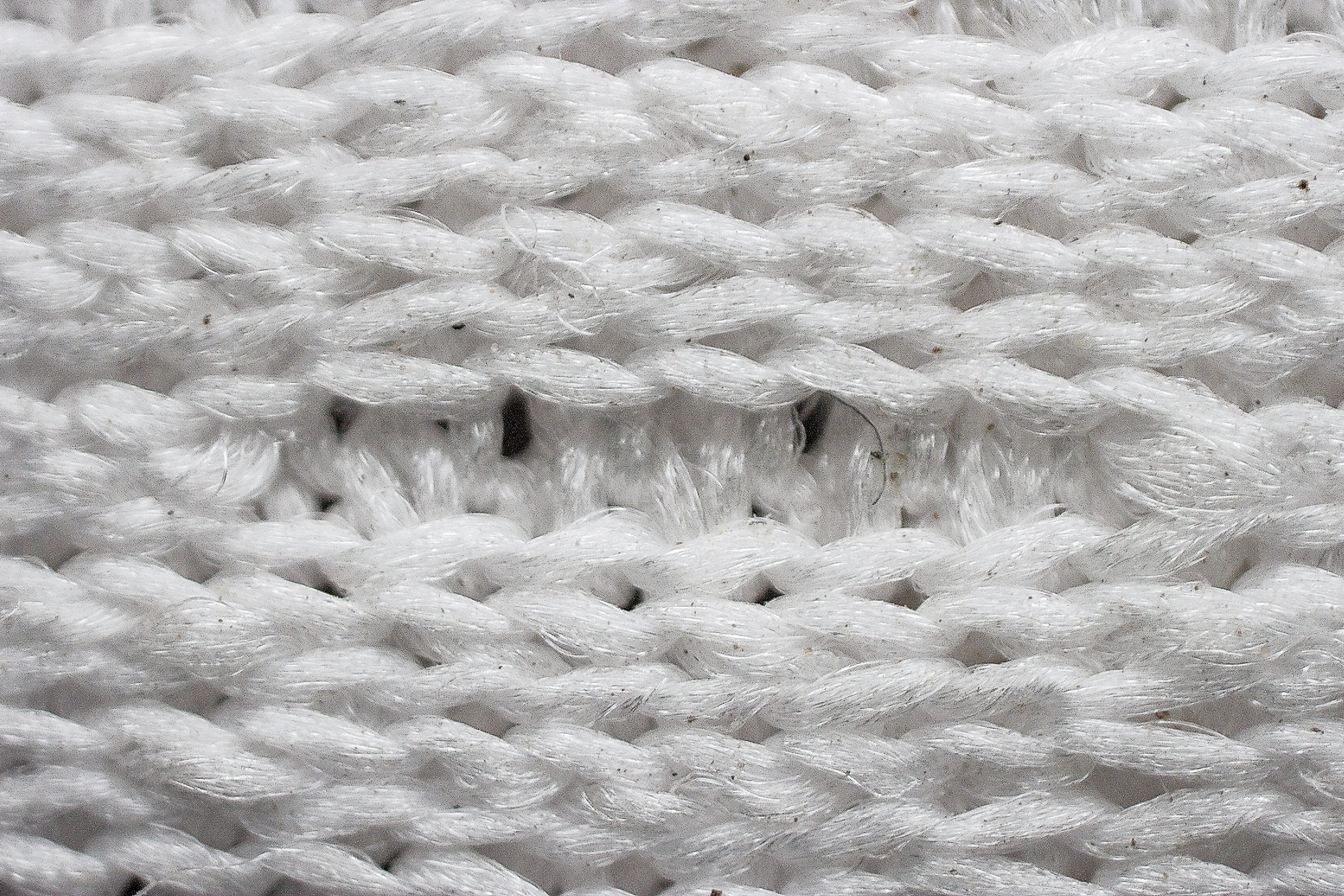
This approach cleverly balances airflow while preventing potential tears, ensuring the shoe's long-lasting integrity.
| Gel Kayano 30 | 5 |
| Average | 3.7 |
Stability
Lateral stability test
The Kayano series has always focused on stability. Even with the significant cushioning in this thirtieth edition, we loved that it remains impressively stable.
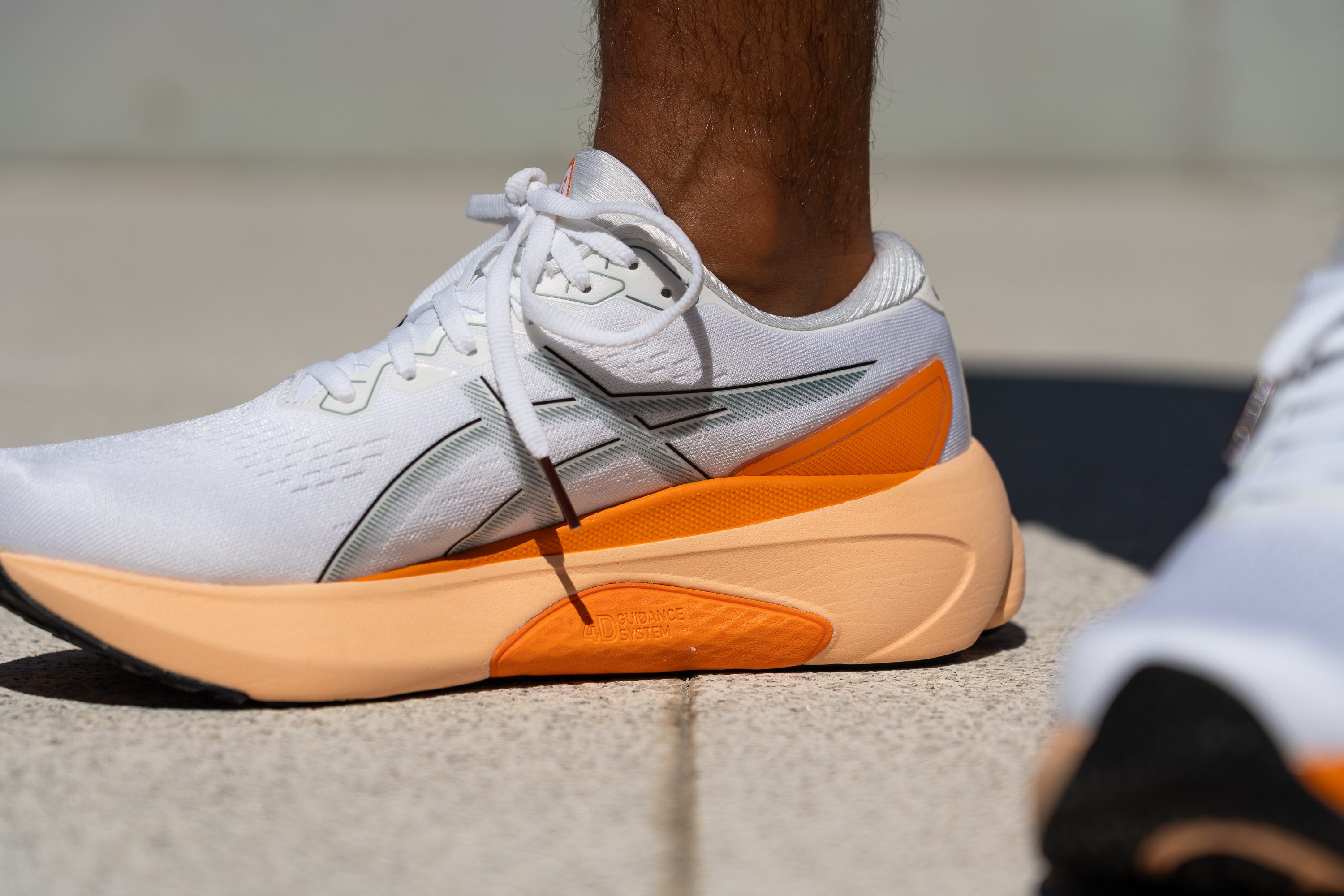
The new 4D Guidance System is the key regarding stability, using a softer foam right under the arch. It adjusted to the shape of our feet, providing consistent stability the more we wore the shoe.
Torsional rigidity
Torsional rigidity is another essential feature for great stability. ASICS, in our opinion, nails it for a daily trainer like this with a 4/5 score in our assessment. Anything less would risk stability, while a max score might feel too rigid for everyday runs.
| Gel Kayano 30 | 4 |
| Average | 3.5 |
Heel counter stiffness
In the heel counter, we felt a similar sensation. However, for some runners, it might come across as slightly firm, although a 4/5 score is what we usually expect in a stability shoe.
| Gel Kayano 30 | 4 |
| Average | 2.9 |
Midsole width - forefoot
Let's be clear—the Kayano 30 is W-I-D-E. We took the caliper in the lab to get a forefoot measurement of 124.3 mm, so it stands in the top 1% of shoes we've assessed in our lab for midsole width.
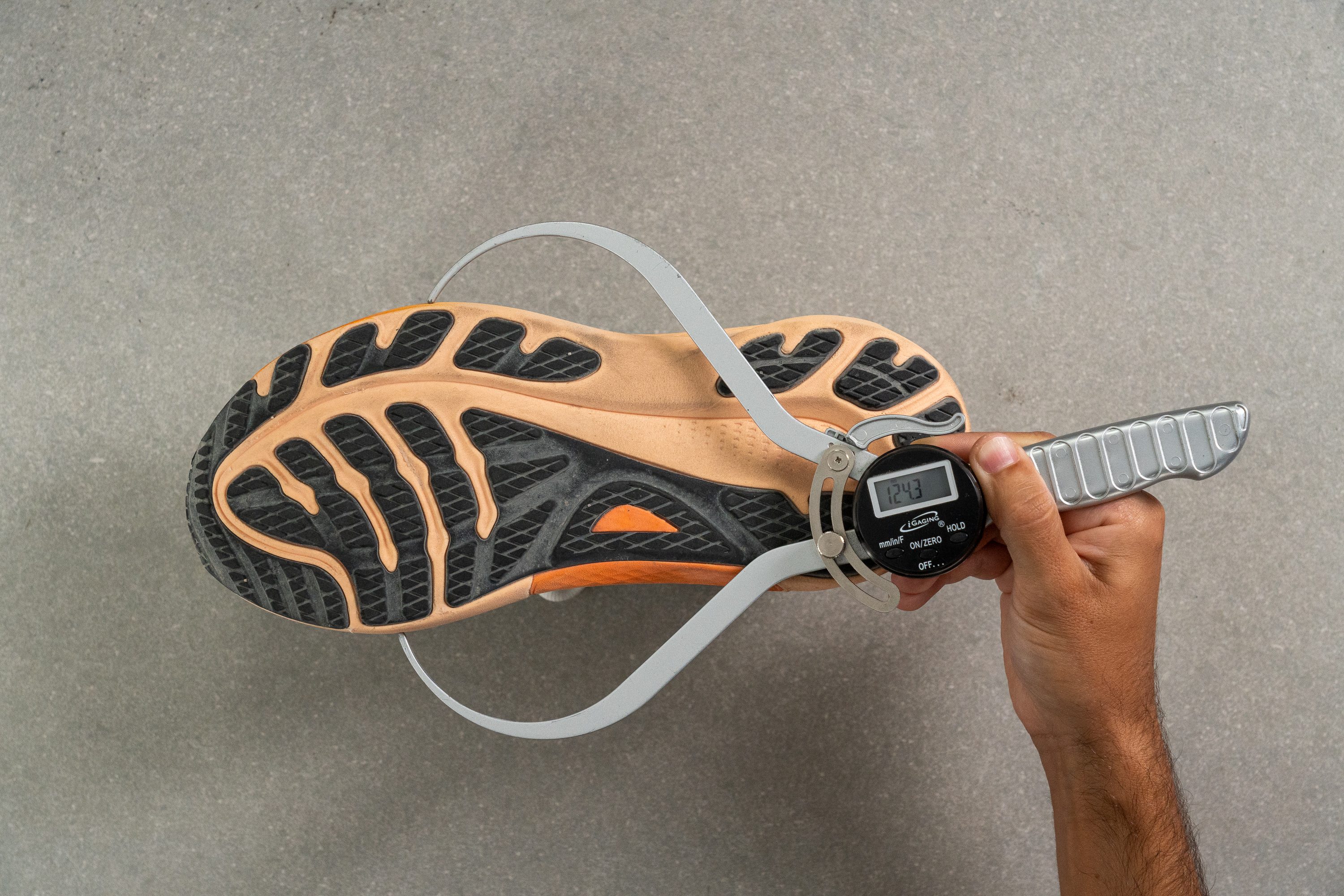
| Gel Kayano 30 | 124.3 mm |
| Average | 114.4 mm |
Midsole width - heel
Similarly, in the heel, we observe a width of 105.4 mm, placing it again among the top 1% we've measured.
Why does Kayano-san opt for this design? The answer is straightforward. With a tall stack and soft foam, he needed some aces up his sleeve for stability: the 4D Guidance System and... the shoe's broad width!
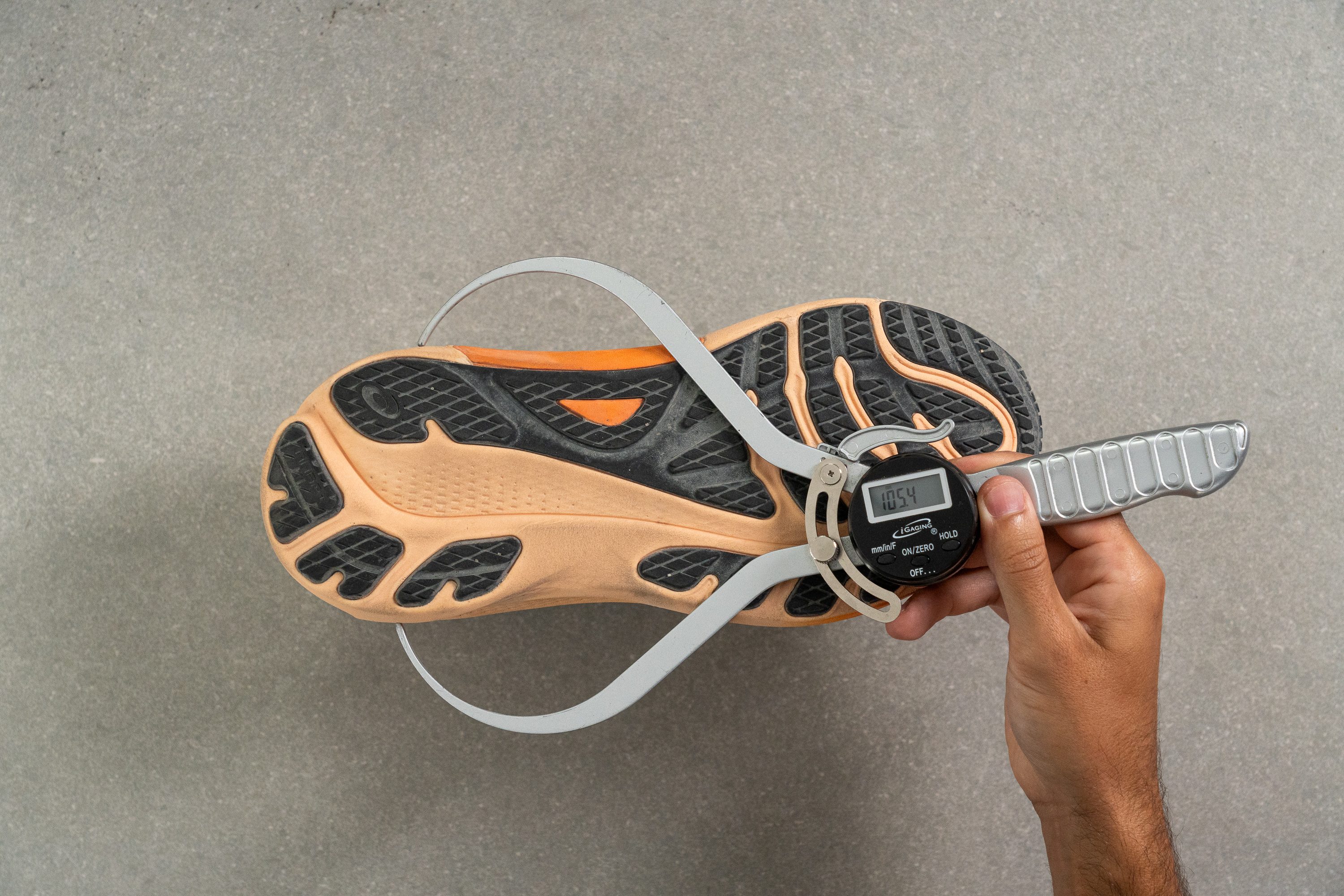
| Gel Kayano 30 | 105.4 mm |
| Average | 90.7 mm |
Durability
Toebox durability
Many shoes that excel in breathability often fall short when it comes to durability, like the Hoka Mach X. However, the Kayano 30 breaks this trend and shines brilliantly.
Upon reviewing the damage, we were thoroughly impressed. We gave it a 4/5 score and it's clear that ASICS delivered an exceptional upper with the Kayano 30.
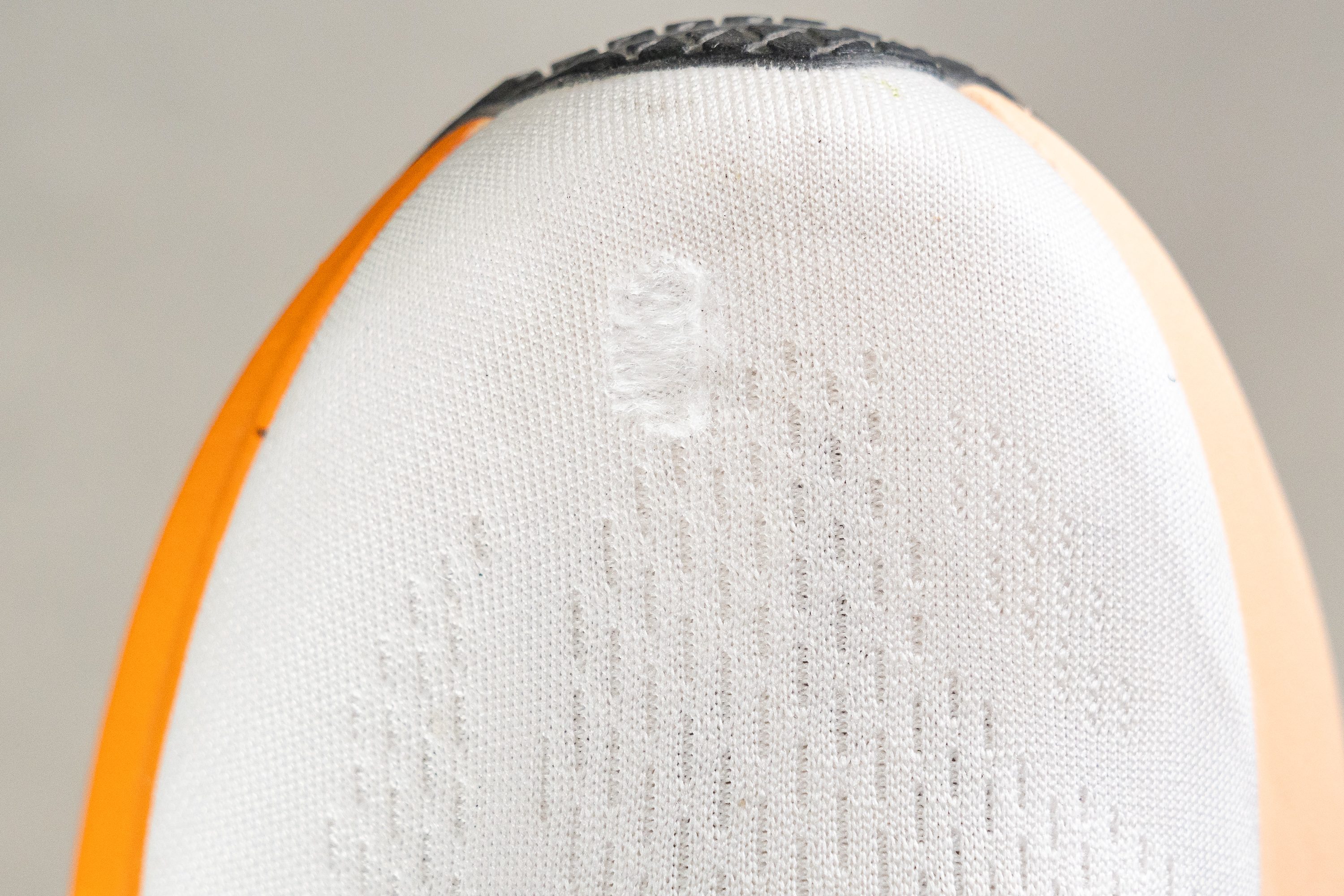
| Gel Kayano 30 | 4 |
| Average | 2.6 |
Heel padding durability
Unfortunately, the heel padding doesn't hold up well and scored a 1/5 in our Dremel test.
It seems ASICS prioritised comfort in the heel area, opting for a softer material that won't irritate the sock or Achilles tendon. But this choice means the heel is more susceptible to premature wear and tear.
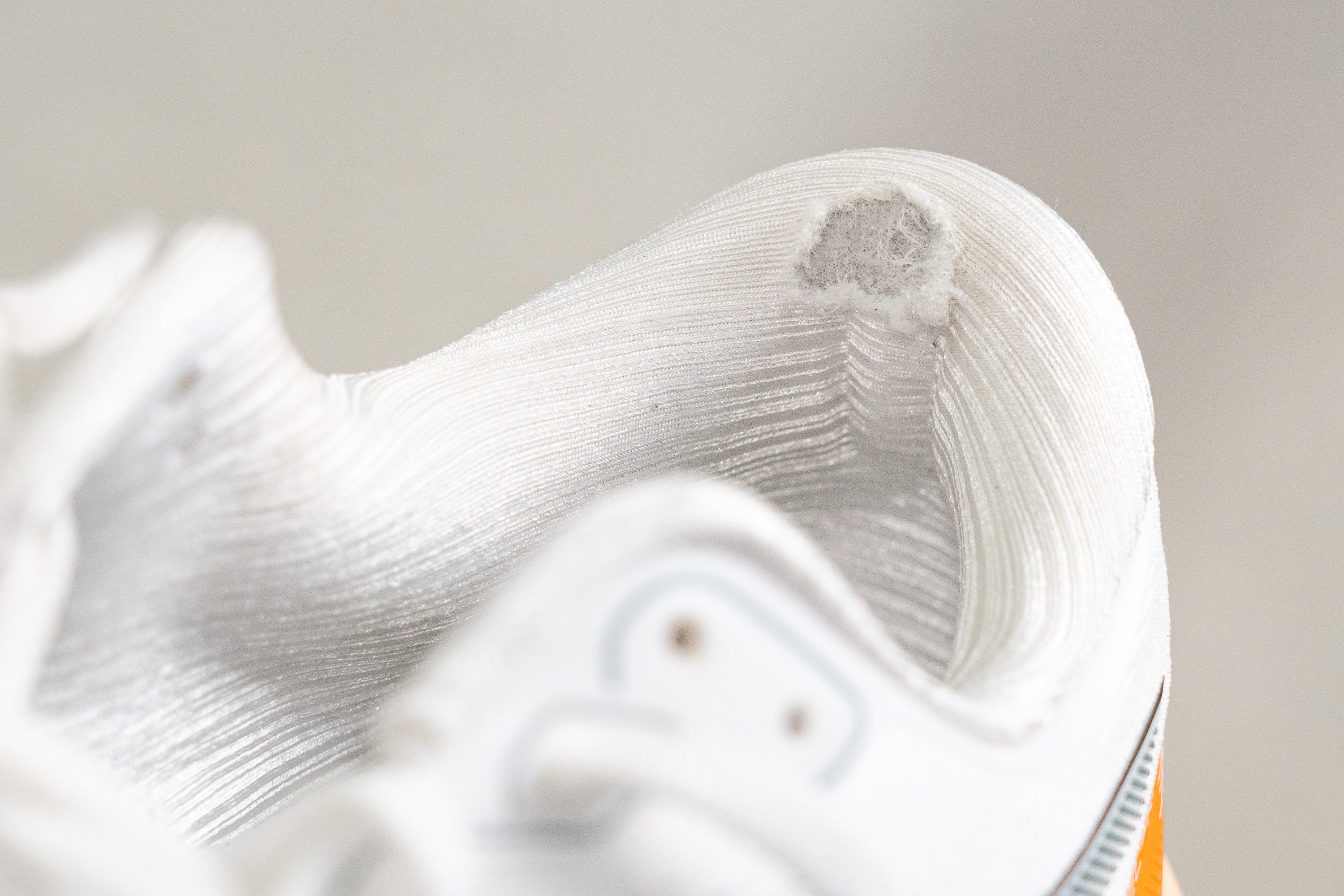
| Gel Kayano 30 | 1 |
| Average | 3.4 |
Outsole hardness
For the outsole, ASICS played it safe. They chose a rubber blend that's quite standard in terms of hardness (80.4 HC), aiming for a good mix of traction and durability.

Although the outsole isn't entirely covered with rubber—to save on weight—it offers generous protection in key areas, especially for pronators.
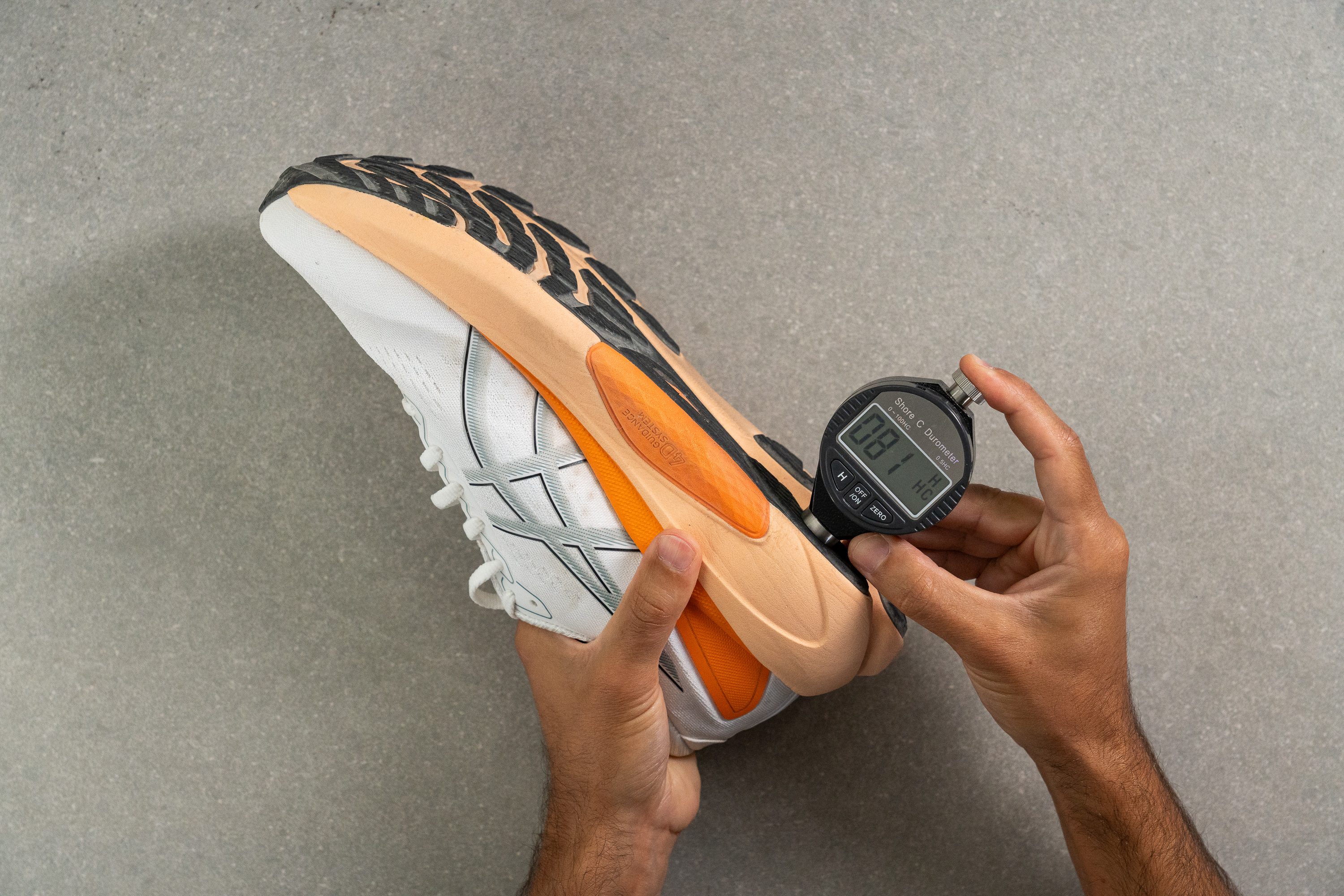
| Gel Kayano 30 | 80.4 HC |
| Average | 79.2 HC |
Outsole durability
We fired the Dremel one more time and the results were in line with our expectations.
As we've mentioned earlier, the rubber hardness is pretty standard, and the 0.9 mm indentation that we measured confirms it.
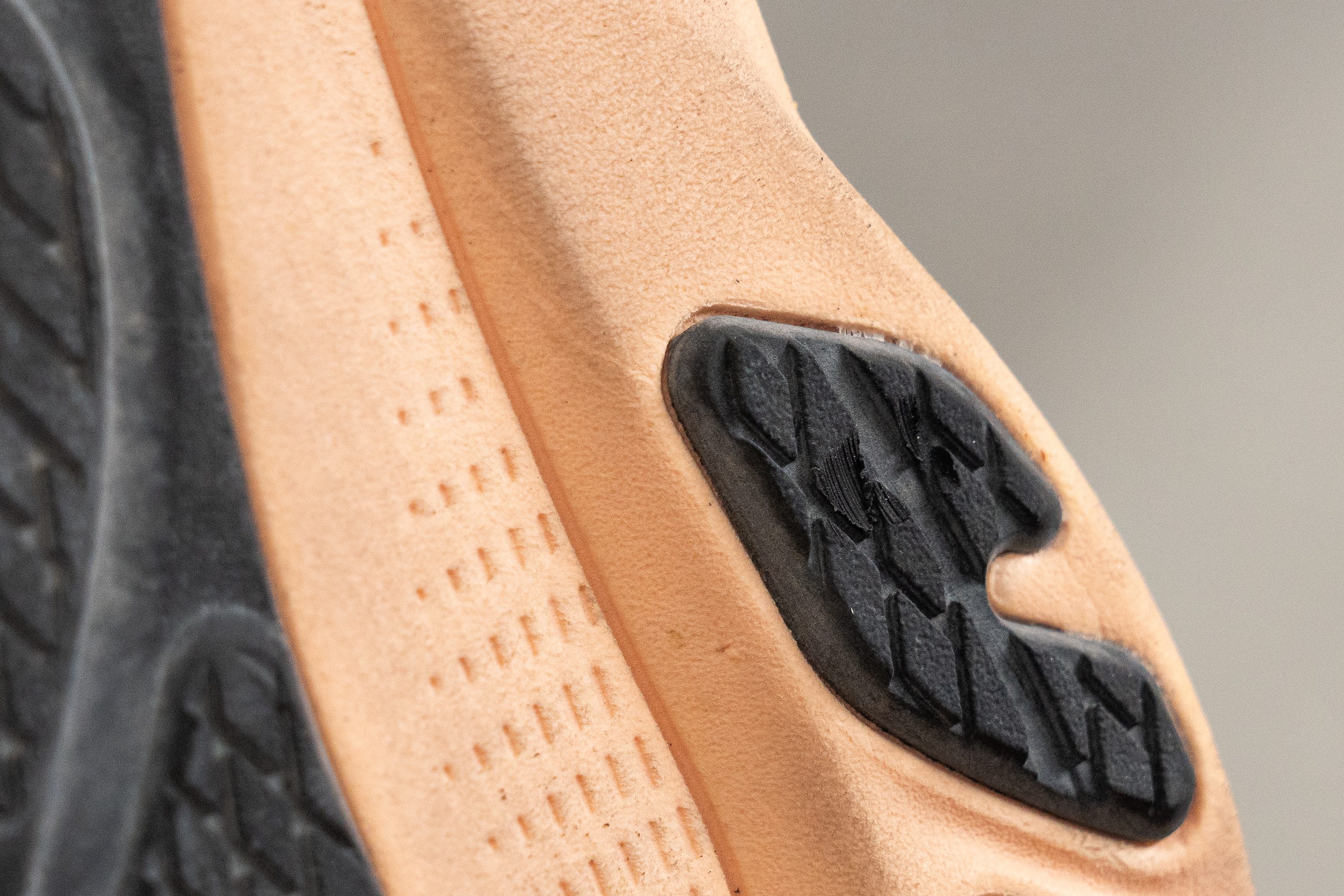
| Gel Kayano 30 | 0.9 mm |
| Average | 1.1 mm |
Outsole thickness
The outsole boasts an impressive thickness of 4.3 mm. This result assures full lasting power throughout the shoe's lifespan.
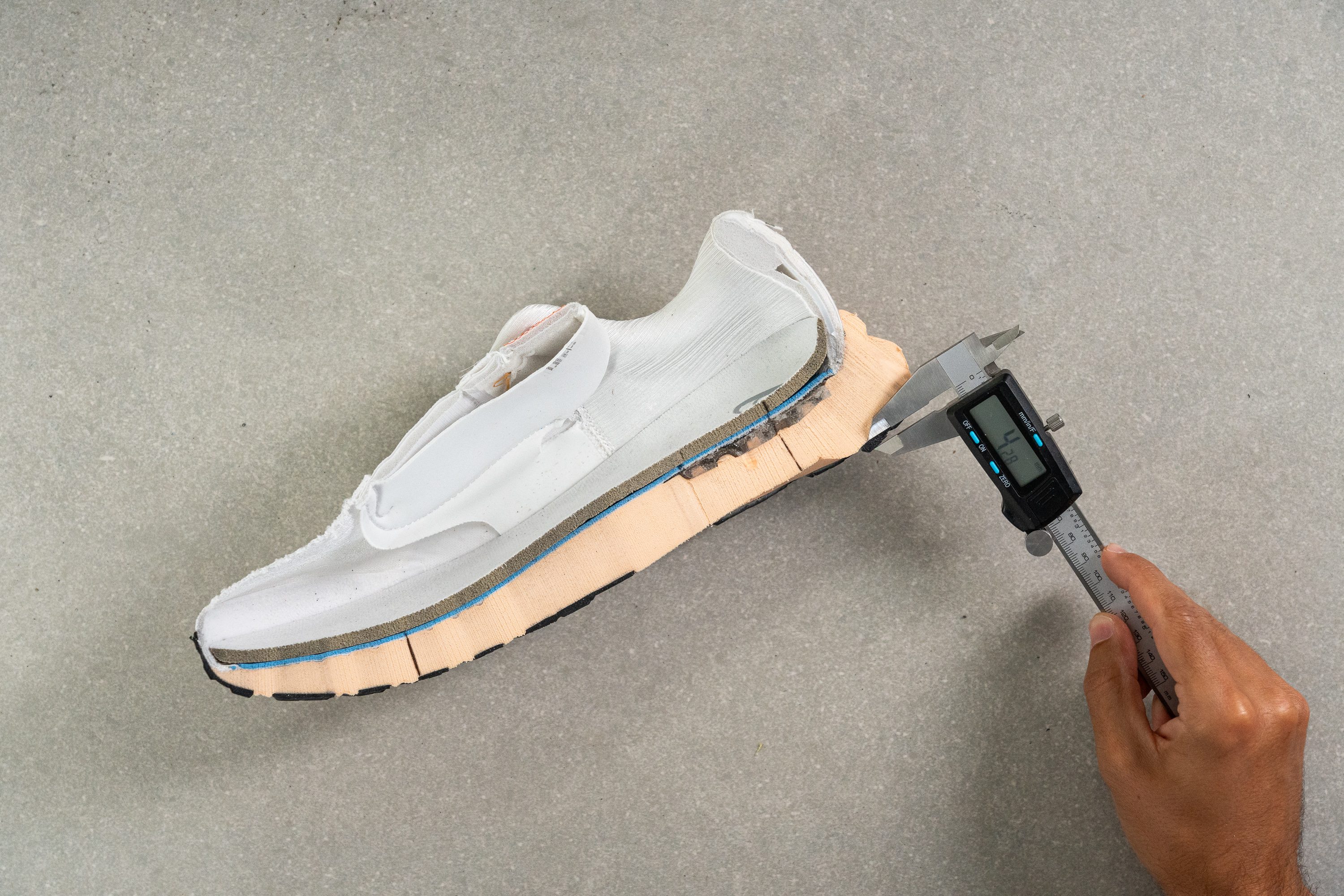
| Gel Kayano 30 | 4.3 mm |
| Average | 3.2 mm |
Misc
Insole thickness
The Kayano series has always been synonymous with comfort, and a thick insole is part of the reason. Measuring in at 5.5 mm in our lab, it's another box checked.
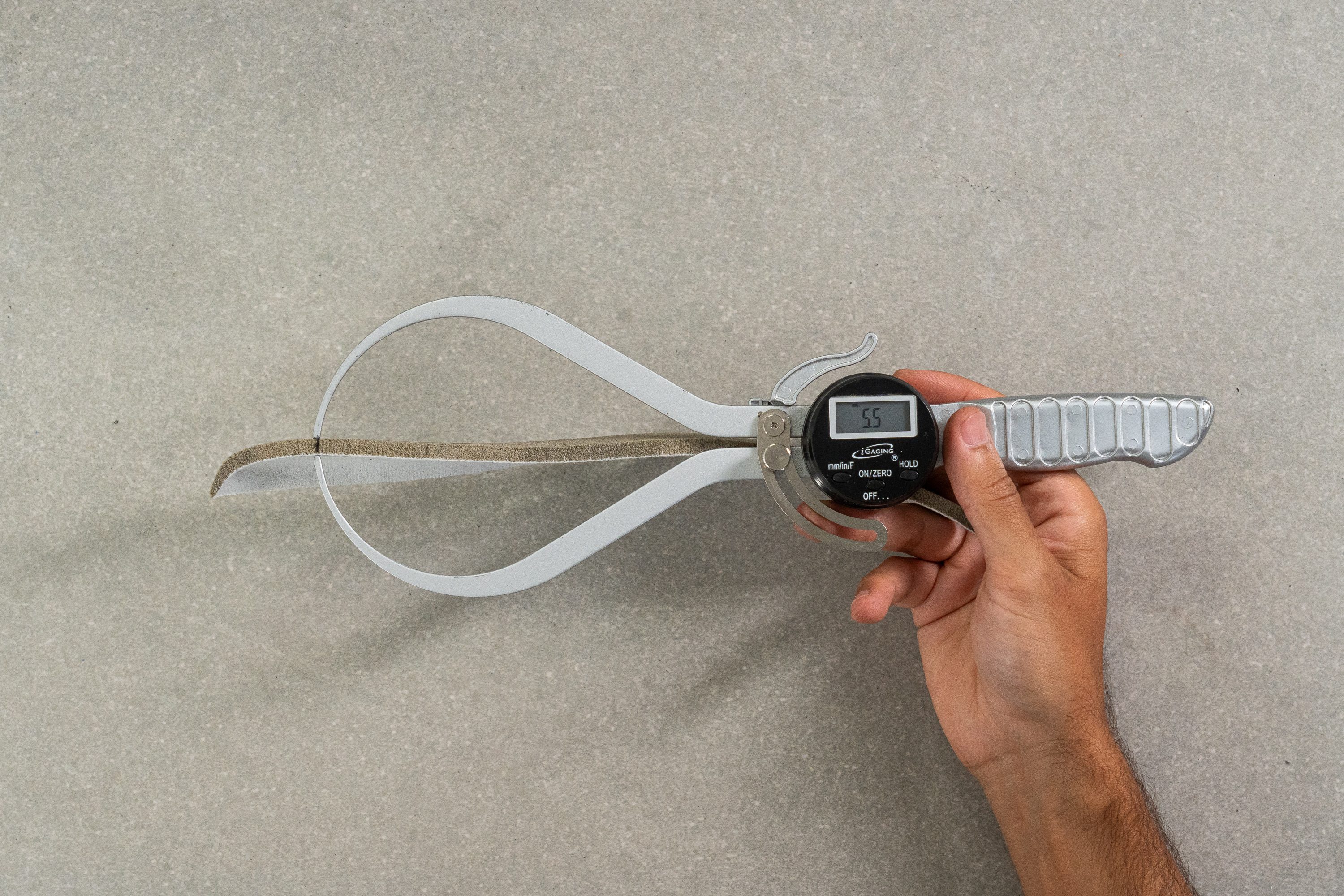
| Gel Kayano 30 | 5.5 mm |
| Average | 4.5 mm |
Removable insole
The shoe's insole is easy to remove as it's not glued, so there's no problem at all using third-party insoles or orthotics.
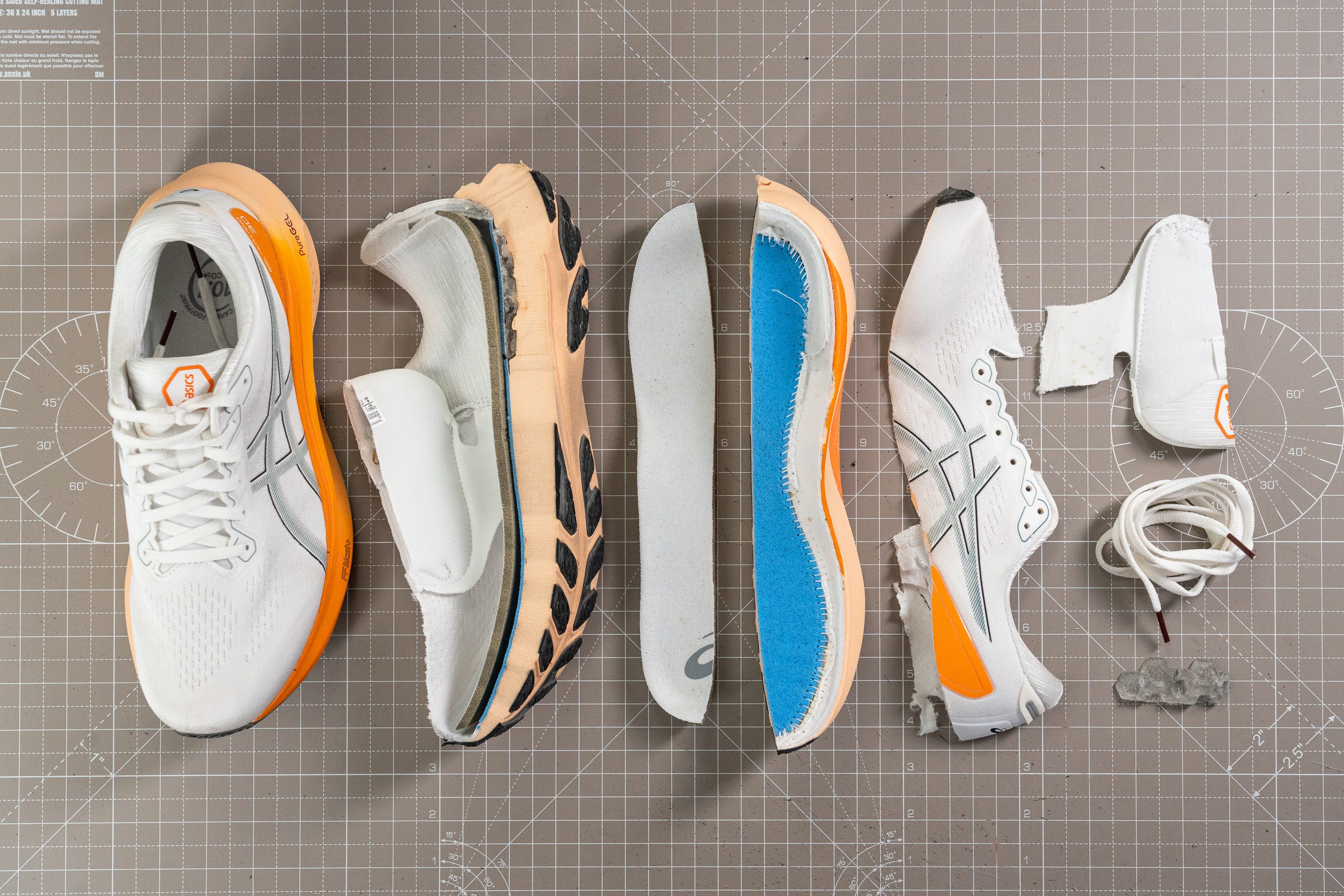
| Gel Kayano 30 | Yes |
Midsole softness in cold (%)
In colder temperatures, we noticed a change. Although the FF Blast+ foam remains softer than many other shoes, it does become noticeably firmer, registering at 24.1 HA.
Why does this issue arise? The FF Blast+ foam blends EVA with Olefin. As we've discussed before in this article, EVA foams often underperforms in cold temperatures.
Witnessing a 47.3% increase, the Kayano 30 clearly falls short when it's chilly out. ASICS really needs to address this, especially given the price tag of many of their FF Blast+ shoes.
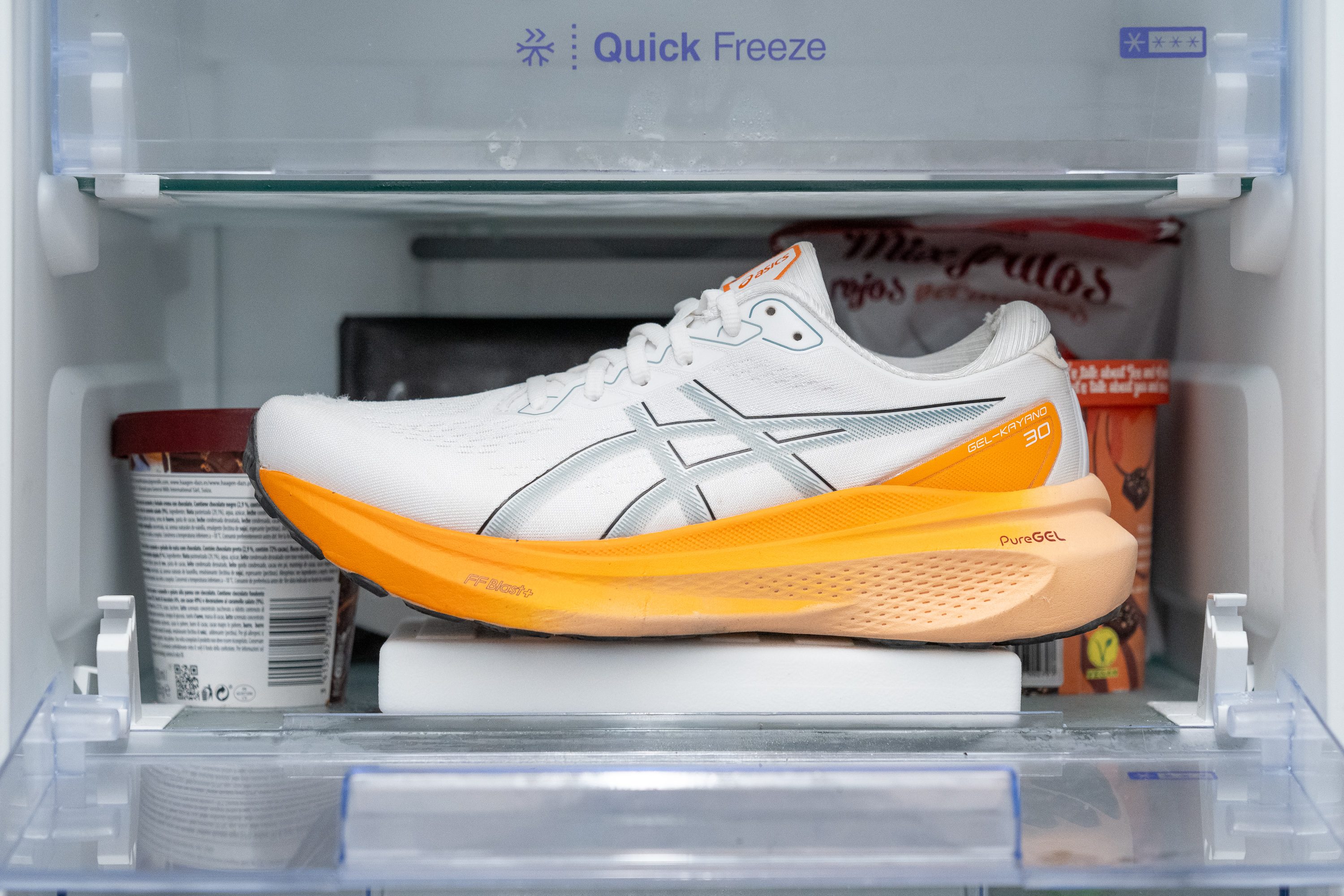
| Gel Kayano 30 | 47% |
| Average | 24% |
Reflective elements
We're thrilled to share that, unlike most running shoes released this year, the ASICS Gel Kayano 30 boasts standout reflective elements on the heel.
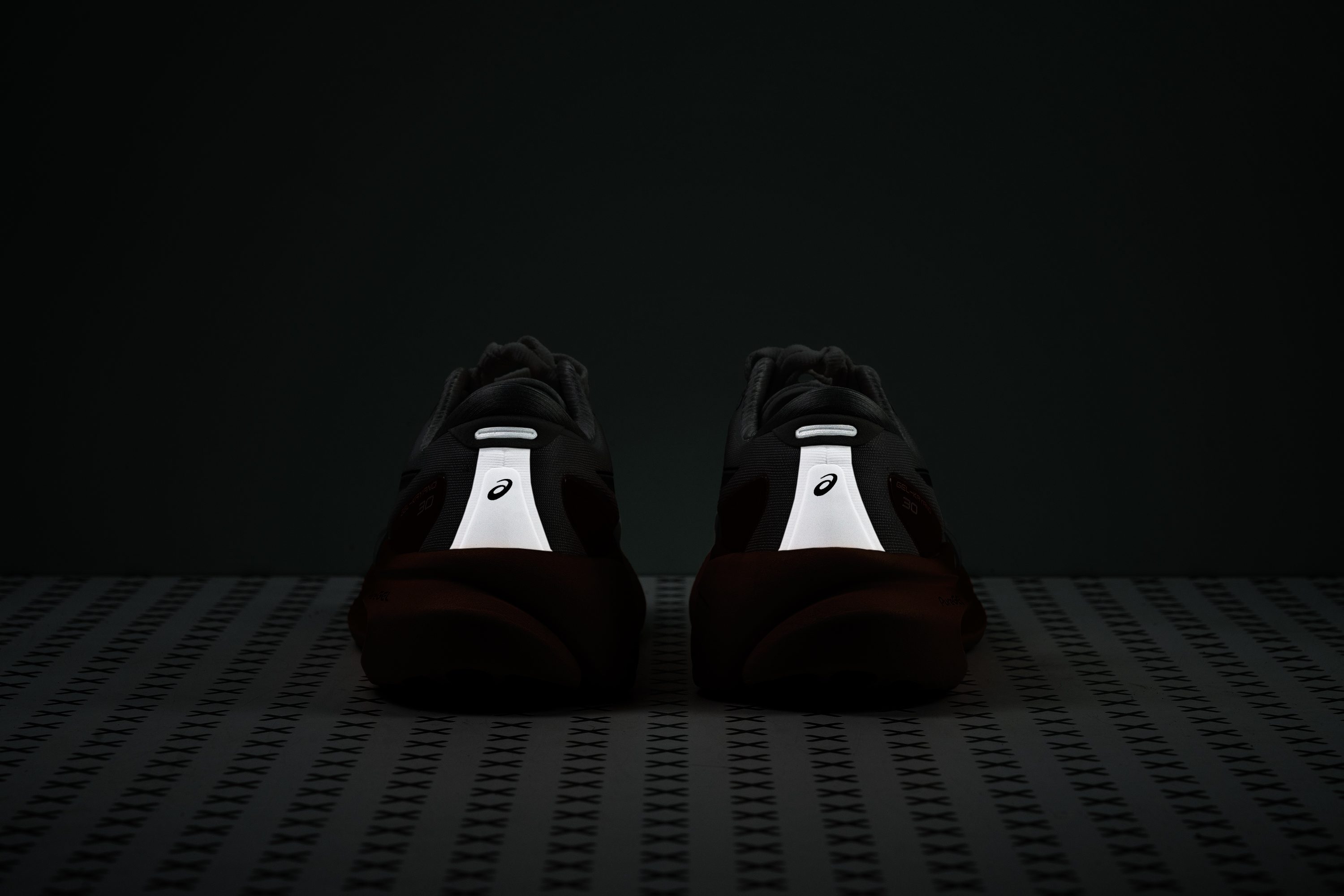
| Gel Kayano 30 | Yes |
Tongue padding
We found that the tongue boasts a generous 7.7 mm of padding.
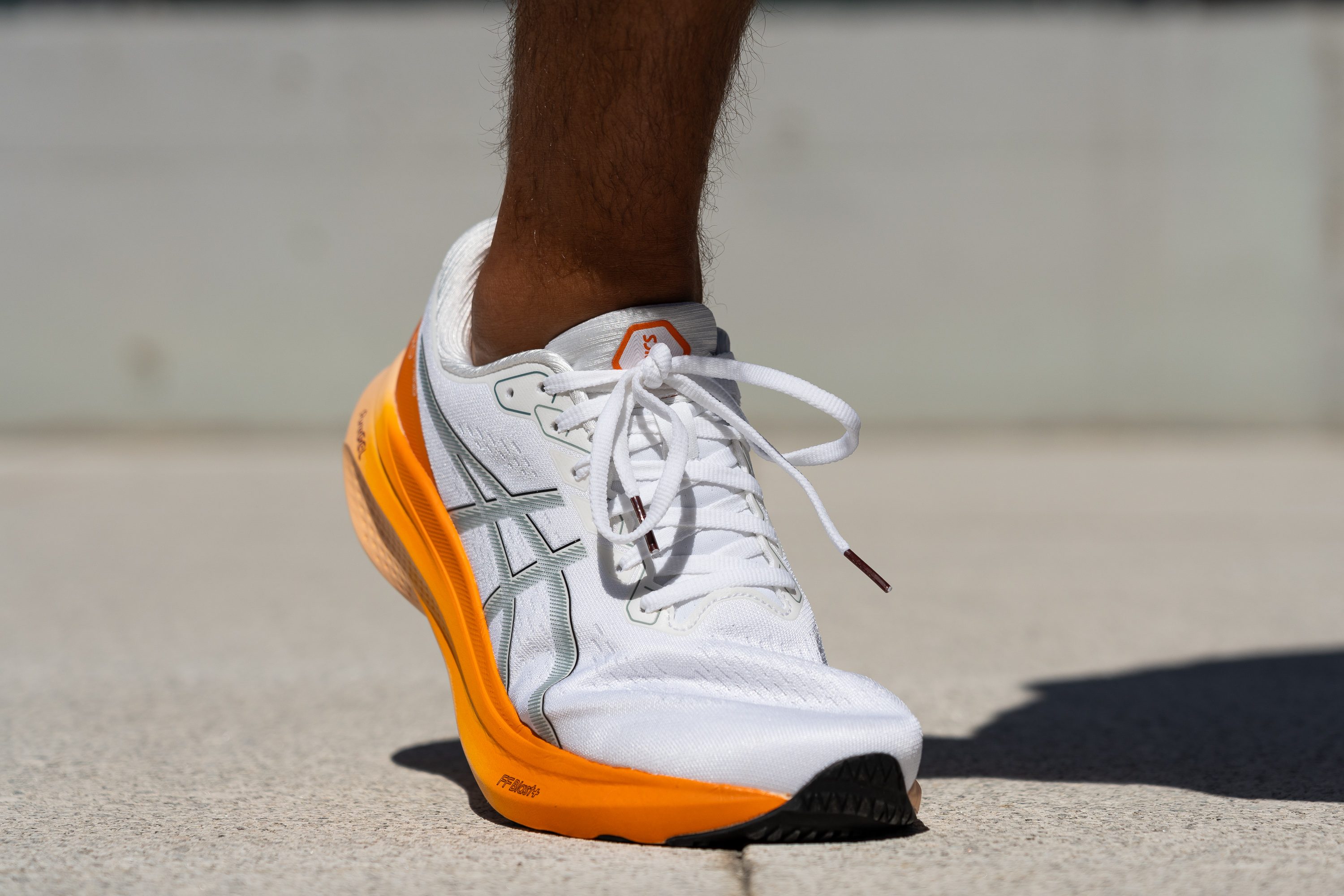
While this is notably more than the average, some might expect even more, considering this shoe's focus on comfort. Yet, we appreciate this choie—it provides ample cushioning without the burden of extra weight.
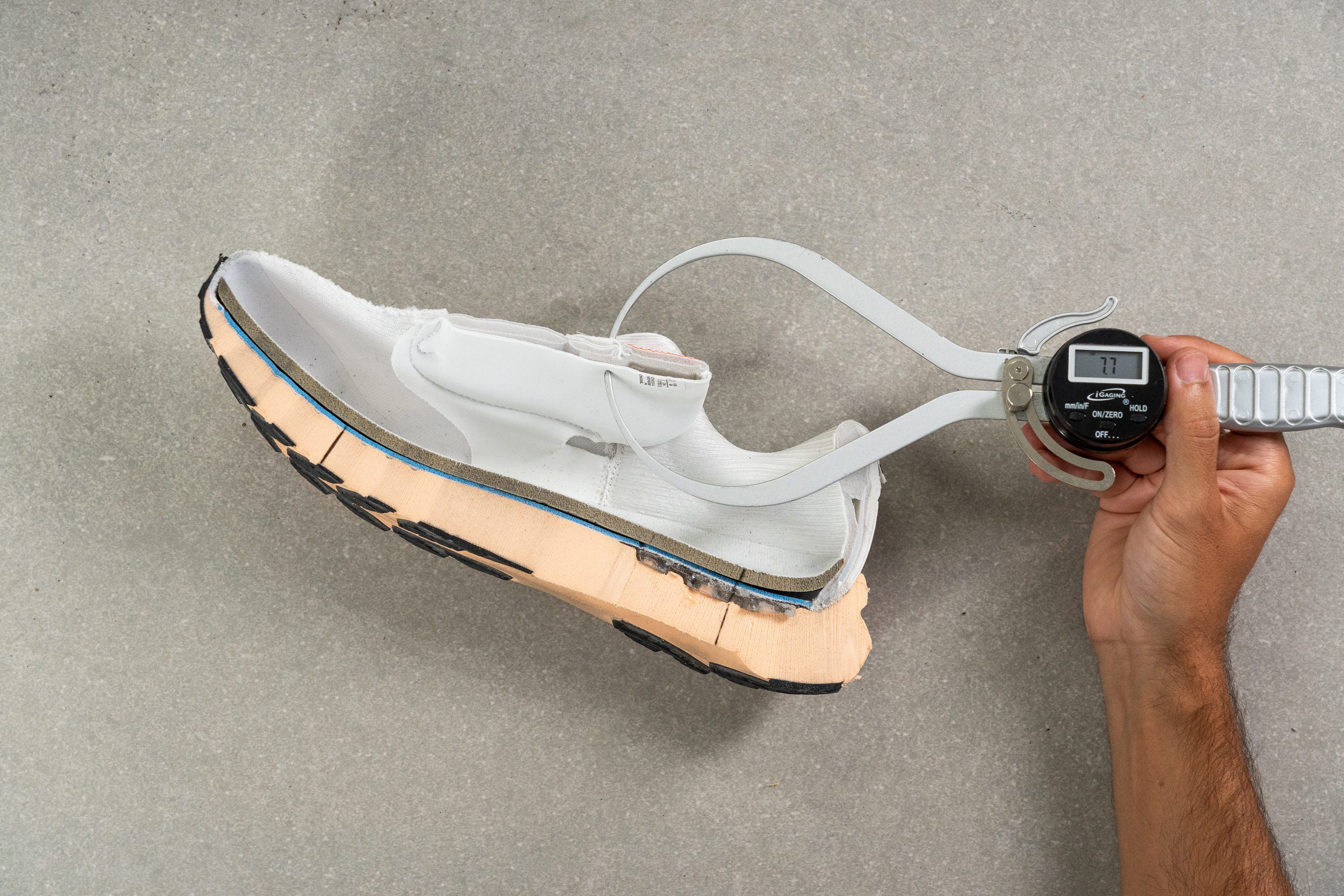
| Gel Kayano 30 | 7.7 mm |
| Average | 5.8 mm |
Tongue: gusset type
The tongue it's semi-gusseted, which not only enhances the lockdown and prevents it from moving around the toes during our test runs. Good choice!
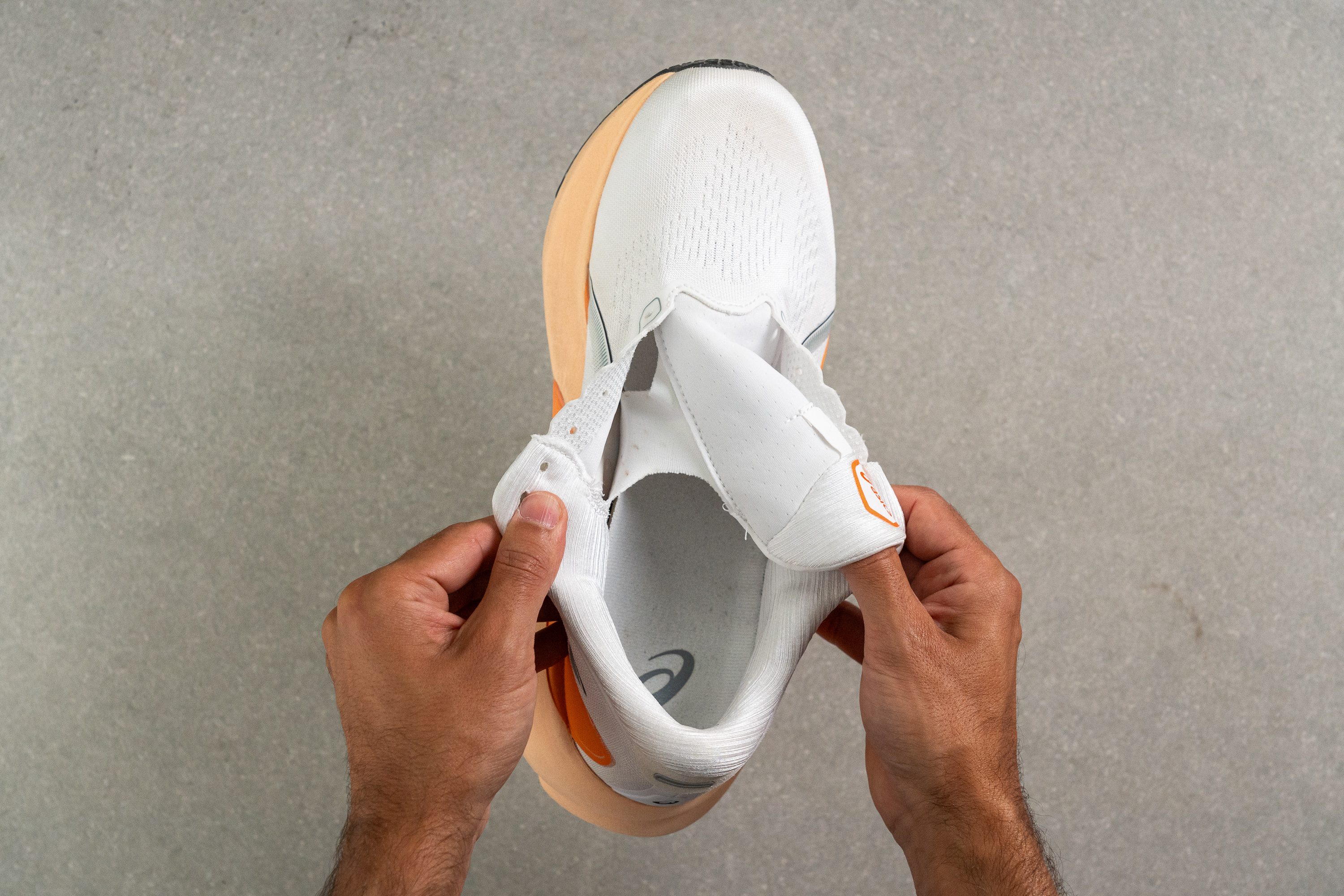
| Gel Kayano 30 | Both sides (semi) |
Heel tab
ASICS decided against including a heel tab on the Kayano 30. While this aligns with the design cues of other recent ASICS models like the Novablast 3, we feel a heel tab might have made slipping into the shoe easier for some of us.
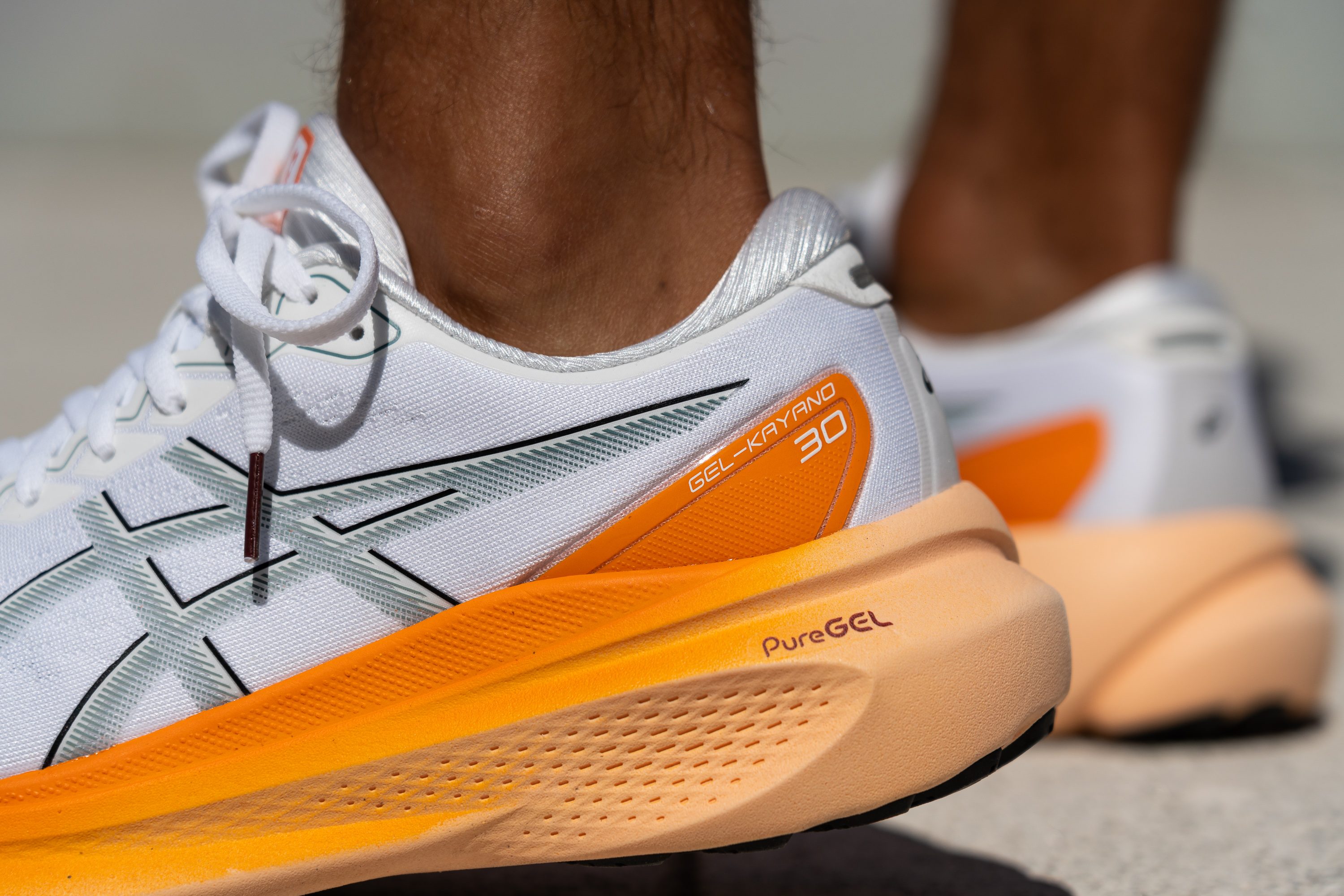
| Gel Kayano 30 | None |

